#built-in water filtration
Explore tagged Tumblr posts
Text
Smart Sinks and Faucets : What Are They, and Why Do You Need One?
A Happy Customer’s Smart Kitchen Transformation One of our customers in Highland Park recently decided to upgrade their kitchen with a state-of-the-art smart faucet . They wanted a solution that combined modern convenience with eco-friendly features. After reaching out to Emergency Plumbing, they scheduled a quick appointment with one of our licensed plumbers, who immediately got to work. The installation process was seamless. Our professional plumber took the time to answer all the customer’s questions, explaining how the smart sink would reduce water waste and make everyday tasks more convenient.
Why Choose a Smart Faucet?
Smart faucets and sinks are designed to offer both style and practicality. Here’s what makes them a game-changer:
Enhanced Functionality: Touchless controls, built-in water filtration, and temperature sensors make everyday tasks easier and more hygienic.
Eco-Friendly Features: Save water and reduce waste with advanced flow controls.
Modern Aesthetic :A sleek design upgrades the overall look of your kitchen.
Whether you live in Highland Park, Deerfield, Northbrook, or other Northwest suburbs, our team of local licensed plumbers can help you choose and install the perfect smart sink for your needs.
What Makes Emergency Plumbing the Best Choice?
At Emergency Plumbing, we’re proud to serve customers across the North Shore and Northwest suburbs with top-quality service.
Transform Your Kitchen Today.
#Smart Sinks and Faucets : What Are They#and Why Do You Need One?#A Happy Customer’s Smart Kitchen Transformation One of our customers in Highland Park recently decided to upgrade their kitchen with a stat#they scheduled a quick appointment with one of our licensed plumbers#who immediately got to work. The installation process was seamless. Our professional plumber took the time to answer all the customer’s que#explaining how the smart sink would reduce water waste and make everyday tasks more convenient.#Why Choose a Smart Faucet?#Smart faucets and sinks are designed to offer both style and practicality. Here’s what makes them a game-changer:#1. Enhanced Functionality: Touchless controls#built-in water filtration#and temperature sensors make everyday tasks easier and more hygienic.#2. Eco-Friendly Features: Save water and reduce waste with advanced flow controls.#3. Modern Aesthetic :A sleek design upgrades the overall look of your kitchen.#Whether you live in Highland Park#Deerfield#Northbrook#or other Northwest suburbs#our team of local licensed plumbers can help you choose and install the perfect smart sink for your needs.#What Makes Emergency Plumbing the Best Choice?#At Emergency Plumbing#we’re proud to serve customers across the North Shore and Northwest suburbs with top-quality service.#Transform Your Kitchen Today.
1 note
·
View note
Text
got too scared abt surveillance n forgot im disabled n have to overshare to experience a fraction of human connection,, everything is pissingggg me AUF lately like its partly this hot ass weather but its also other stuff. organizing my flash drives, n going thru my old family photos like huh y was i in charge of this when i was 12, w like a huge emotional storm in my peripheral vision, not quite here yet but we should b preparing for cover yknow
#stfu aito#i dont get nostalgia i was sooo miserable. never look back type#ambler road project crumbling water n electrical infrastructure barbie movie anti indigenous sentiment no built in A/C or air filtration#rent increase internet down til september maskless community meetings (n everything else.)#thats the spark notes
1 note
·
View note
Text
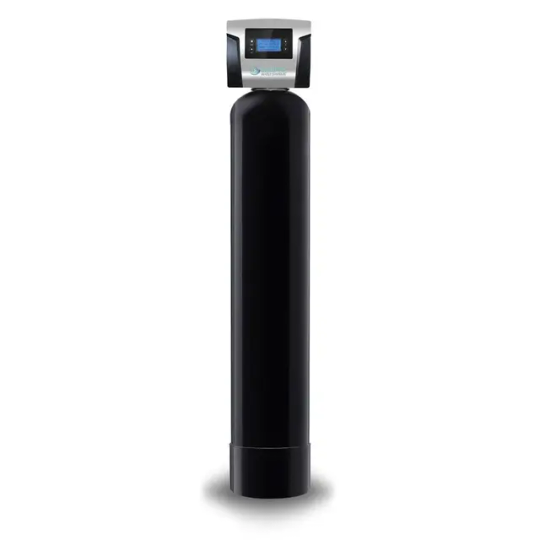
SoftPro AIO Iron Master Water Filter – Best Iron Filter for Well Water
If you are struggling with high iron levels in your well water, the SoftPro AIO Iron Master Water Filter is the ultimate solution. This best-selling iron filter efficiently removes iron, manganese, and sulfur, providing you with clean, odor-free, and safe water.
✅ ASSEMBLED IN THE USA – Built with high-quality materials for durability and performance. ✅ EASY INSTALLATION – Hassle-free setup with user-friendly instructions. ✅ FREE SHIPPING – Get it delivered to your doorstep at no extra cost!
Why Choose SoftPro AIO Iron Master Water Filter?
The SoftPro AIO Iron Master Water Filter is designed with advanced Air Injection Oxidation (AIO) technology, which naturally oxidizes and removes iron without using chemicals. This makes it one of the most efficient and cost-effective well water filtration systems available today.
Key Features of SoftPro AIO Iron Master Water Filter
✅ Air Injection Technology – Uses oxygen to oxidize and remove iron naturally. ✅ Removes Iron, Manganese & Sulfur – Prevents stains, black deposits, and foul odors. ✅ Chemical-Free Filtration – No harmful chemicals or additives required. ✅ High-Flow Rate – Ensures steady water pressure and efficient filtration. ✅ Low Maintenance & Long-Lasting – Designed for durability and minimal upkeep.
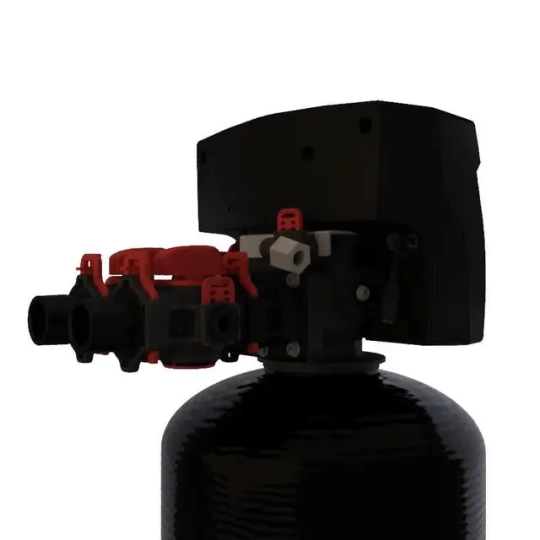
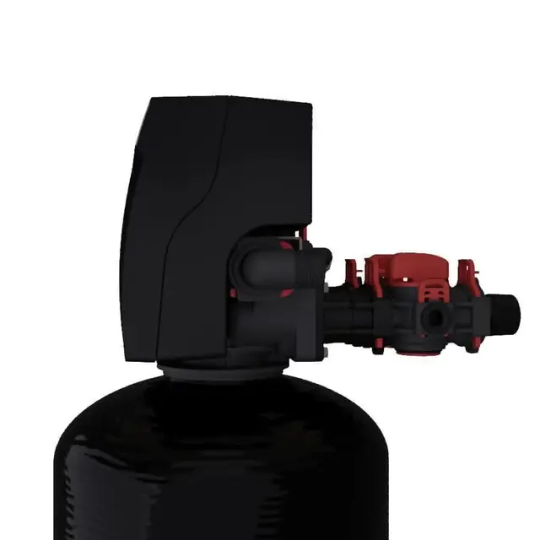


Benefits of Using SoftPro AIO Iron Master Water Filter
✔ Healthier Drinking Water – Eliminates contaminants for safe, clean water. ✔ Protects Plumbing & Appliances – Prevents iron stains, clogging, and corrosion. ✔ Better-Tasting Water – No more metallic taste or sulfur smell. ✔ Cost-Effective Solution – Reduces dependency on bottled water and expensive treatments.
Why is SoftPro AIO Iron Master the Best Iron Filter for Well Water?
Customers love the SoftPro AIO Iron Master Water Filter for its high efficiency, reliability, and easy maintenance. Unlike traditional iron filters, this system is eco-friendly, requires minimal upkeep, and delivers exceptional filtration performance.
Final Verdict
If you're looking for the best iron filter for well water, the SoftPro AIO Iron Master Water Filter is the top choice. Its powerful filtration, chemical-free operation, and long-lasting durability make it the best-selling solution for well water purification.
👉 Upgrade to the SoftPro AIO Iron Master Water Filter today and enjoy pure, iron-free water effortlessly!
👉 Check our official Website: SoftPro AIO Iron Master Water Filter
#Iron Master Water Filter#SoftPro AIO#Iron Water Filter#ASSEMBLED IN USA#iron removal#Water Treatment
322 notes
·
View notes
Note
(Follow-up question): what’s the safest a human can reasonably be in the TSV reality then? The equivalent of modern-day ultra-wealthy doomsday preppers hiding out in their underground titanium bunkers with radiation-proof vault doors, self-sufficient water filtration systems, enough shelf-stable canned food to last 10 lifetimes, solar-powered hydroponic gardens, downloaded-and-backed-up Internet, and a genetically diverse pet population for happiness purposes?
I imagine a hyperfixated TSV doomsday prepper might accidentally worship the idea of independent survival so hard that the bunkers ascend & eat the human inhabitants bc the humans are volatile variables that threaten the bunker’s systemic stability?
What is the most reasonably safe way a powerful but normal human in TSV can plan out the rest of their natural lifespan?
Something that occurred to me last week while working on the book is that inhabitants of the setting are likely given to lots of little bits of extra social etiquette like 1) glancing at people and things more often out of the corner of their eyes, 2) refusing gifts as a matter of courtesy but also self-preservation, 3) considering it bad luck to whistle or hum at random, 4) the polite thing being to enter through a door ahead of someone else, rather than holding the door open for them. All of which I guess would be everyday measures to ensure that you don't accidentally call a god down upon yourself or become the victim of a sacrificial prayer-mark.
But yeah, I 100% imagine that the landscape is littered with bunkers built by preppers who then found themselves trapped in there and fighting for their lives, having called down some horrible god of isolation (or tinned food!)
296 notes
·
View notes
Text
You know as funny as it was to see Ekko give Jayce a hard time about the hexgates's failsafe being built into Zaun, it was a bit jarring for Heimerdinger to be there and Ekko not say anything to him. Yes, Jayce built the hexgates, but Heimerdinger made it clear that he would oversee and advise on all developments. This design was approved by him, and Ekko has nothing to say?
I can see an argument be made that Ekko's more critical of Jayce because Jayce is still on the Council, but Heimerdinger was still there for the construction. Jayce is also leaving the council, he hasn't been to any of the recent war council meetings, he's practically in the same position politically as Heimerdinger. Yet Ekko's ire is reserved for Jayce.
Slightly unrelated, but the reveal also implies that Viktor knew about this as well, and was a part of it. Maybe any concerns Viktor voiced carried little weight because he was a Zaunite, but that implies Heimerdinger didn't take zviktor seriously. And that also means Viktor didn't warn any communities in Zaun that might be affected, since the failsafe connected to air and water filtration.
#arcane#arcane ramble#ekko arcane#jayce talis#Heimerdinger#i know the show's biased towards heimerdinger but the packed pacing makes these plotholes more prominent
290 notes
·
View notes
Note
Hi Derin! Sorry if this has been asked before, but I'm amazed by the vast array of cultures and gender norms in TTO:U. How did you come up with all of it?
I just thought "hey wouldn't it be funny if there was a little guy" and then made them, and thought "hey what norms would exist in a culture under these conditions" and then made those.
In all seriousness, most of my worldbuilding comes down to tearing down assumptions. Brennans exist because I fucking hate gender and I'm sick of seeing the gender binary or "gender binary Plus Nonbinary Extra People (who still live in a world that assumes a gender binary)" as some immutable natural law that all societies will forever cling to, and I wanted to make a society that was harder for readers to inevitably sort into a binary as they always, always fucking do. (Partial success; I have seen some absolutely rancid takes on the TTOU gender ternary that make me want to break my computer.) The array of different cultural family structures exist because those are different ways that societies can be built on smaller units. The Arboreae and the two space elevators and the Khemin exist because that is a potential response to a critical climate crisis.
On top of that, most of my ideas are stolen. I once read a short story about people who lived under the ocean on an alien planet and spent most of their time just cruising around the ocean in big bubble-like biological submersibles and that was their job, because their submersibles cleaned the water by feeding on things in it; they were employed to be part of the ecosystem. The Khemin, wandering about the ocean as both environmental monitors and trash-gatherers, were inspired by this; from there, I just thought on what sort of family structure and traditions such a group would develop for a stable society. When I was a teeny tiny child I saw a guy on Ripley's Believe It Or Not who was trying to build a self-sustaining floating island to sail around the world on. Absolute disaster of a plan, man knew shit about ecology or farming, but a bit later on I got really into swamps for awhile and started thinking of using plant roots as water filtration systems and, with an eventual biotechnology degree, multiple years hyperfixating on ecology and evolution, and touch of Magic Future Genetic Engineering, that eventually became the Arboreae. The social structure of Hylara is somewhat inspired by CJ Cherryh's azi, particularly the way that Florian and Catlan are raised in Cyteen. The Hylarans are very much not azi (the azi being slaves brainwashed from birth via hypnosis) but the way they are raised fed into building a society batch-raised by robots and each other with no natural family unit. You can just steal concepts from the real world or from scifi and build them into your own thing it's fine.
Anthropologically speaking, the golden feature of any social structure or cultural practice is *stability*. This is the one feature upon which everything is judged. Just or unjust, productive or unproductive, authoritarian or free, structured or unstructured, when developing a society your key thing to worry about is "is this stable? Would a society survive for multiple generations on this norm?" and if your Weird Idea isn't stable, either ditch it or -- far more interesting -- adjust it and your parameters until it is. Different norms will be stable in different environments and built on different histories -- Khemin and Hylaran norms are not interchangeable because of the environments, tech, political climate and reproductive methods the two cultures have. But if it's stable, you can throw in whatever weird shit you want.
370 notes
·
View notes
Note
23 + sambucky 💛
23. wearing someone's clothes
In spite of his phone buzzing for the sixth time in the space of two minutes, Sam doesn't bother to check it. He's not slacking on the job: he's flanked by other superheroes, all of whom would also be getting notifications if something world-threatening were happening, and he's got AJ and Cass and Sarah in his immediate field of view.
The frenetic buzzing of six--wait, no, make that seven--text messages in no time at all can only be the work of one person, and that person is safely ensconced at the palace in Birnin Zana, undoubtedly being as much of a nuisance to his friends there as he is to Sam.
There's not much of a question as to what the text messages say, so Sam lets them roll in undisturbed, and makes sure that all of the cameras catch him emphatically not checking his phone. Instead he brings his attention to the students in front of him, crouching down to get a better look at the device that they built in their environmental science club.
He points to the receptacle at the top--it's a water filtration system--and asks the group how it works. They're very excited to answer, and when Sam asks specific questions about the mechanisms and how hard the process was, he watches them light up. He talks to them for so long that one of the PR people has to gently nudge him along to another group. Sam's phone periodically keeps buzzing away in his pocket, but he ignores it in favor of talking to all the students, doing his best to ask relevant questions and toss around jokes to make the shy ones laugh.
The event ends with plenty of pictures and plenty of questions about his own wings and how they work, and when it's all over, he feels the same pleasant exhaustion that he feels after a good workout or a mission where things went to plan. In the car on the way back to the house, all AJ and Cass can talk about is how cool all the Stark prototypes were, and Sam promises to let them mess around in his workshop tomorrow so they can do some inventing of their own.
It's not until he's back home that he remembers to even check his phone, putting it on the charger and laughing when the screen lights up to reveal thirty-two text messages from Bucky. The last one came in just a minute ago, so Sam flops down on the cozy armchair in the corner, Bucky's favorite place to curl up on nights when sleep is hard to come by, and calls him back.
The phone barely rings once before Bucky answers, skipping a greeting entirely so he can say, "You stole my sweater!"
Sam laughs. "Hi to you, too, baby."
There's a huff on the other end of the line. "Hi, sweetheart. I miss you, and also, you stole my sweater."
"Did I?" asks Sam. "How do you know that it didn't just find its way into my side of the dresser? You're not very careful about keeping our things separate, you know."
"Yeah, I do know," says Bucky. "That's why when I was packing for Wakanda, I asked you, 'Sam, love of my overlong life, man I would do anything for, have you seen my favorite green sweater?' And when you said no, I asked if you checked your side and you said that it wasn't in your sweater drawer, either."
That's because it was strategically placed in a laundry basket under half a dozen polo shirts that Bucky would never touch, Sam doesn't explain. "Sounds like it just got misplaced, and maybe someone shouldn't wait to pack for their trips until half an hour before they leave."
"Yeah?" asks Bucky. "Is that what it sounds like, and not like someone had their eye on my sweater and waited until I was distracted to snipe it and wear it to a public event where he knew I'd see him on TV?"
"Well that's just silly, Buck. Who would do that?"
"It's impossible to say," replies Bucky, making Sam laugh. Then, after a moment of quiet, he adds, "It looks good on you."
"Thank you," says Sam, and it shouldn't still make warmth rush to his cheeks when Bucky compliments him, but here he is. "Does that mean I get to keep it?"
Bucky snorts. "Let's not get carried away, Wilson."
"That's hardly getting carried away; we just established that I wear it better than you do."
"When did we establish that?" sputters Bucky.
"Are you saying it's not true?"
"Of course not," replies Bucky, without hesitation. "I saw how your arms looked in that thing; it's a fucking revelation. That's not the point."
"Ooh, I've never been called a revelation before," teases Sam.
He expects another grouchy reply, but instead, Bucky just says, "Yes, you have."
Sam actually stops and pulls his phone away from his face to make sure he's still connected. "What was that?"
"Nothing," says Bucky. "Tell me about this science thing that was so important you had to steal my sweater for it."
"Uh-uh," says Sam. "Nope. You tell me who's going around calling me a revelation."
"Sam."
"Bucky."
"You know who it was."
And yeah, Sam's good enough at putting together evidence to get to that conclusion, but he wants to hear it from Bucky all the same. "Tell me anyway?"
"All those times when you crashed into my life in all those different cities, you brought something with you. Do you remember that?"
As if Sam could ever forget. "My folks raised me never to show up empty handed, you know that."
It had been more than that, of course. He hadn't known how else to get Bucky to trust him, sure he was still struggling to trust himself most days. The whole point had been to make sure that Bucky was safe and whole, so the first time Sam managed to cross paths with him, he'd brought a loaf of bread and some strawberries from a roadside stall. Another time, it had been flowers, other times cups of coffee or books.
"Every time you showed up and forced me to take the thing you were giving me, I had to figure out how to be a person about it. I'd forgotten what it was to be annoyed or impatient or to want someone to stay even when you knew they couldn't."
Sam's breath catches in his throat a little, but Bucky doesn't stop.
"And then you would just talk at me for a couple minutes, and then you'd get your stuff and be on your way, and I'd have to find a safe place where I could face up to the fact that you knocked me on my ass with some wilted daisies that you bought for five euros. What else do you call someone who brings you a part of you that you thought you'd never see again?"
"What the fuck, Barnes?" breathes Sam, rasping a little because of the sudden lump in his throat.
"It's the truth!" says Bucky, suddenly defensive.
"Yeah, well, you couldn't have waited to share that truth until I could hear it in person? So I could kiss the shit out of you the way you deserve?"
"Oh," Bucky says quietly. "You know, I could--"
"Absolutely not. Whatever you're thinking, absolutely not. You just managed to earn the Wakandans' trust again; you're not stealing a talon fighter for a booty call."
"It wouldn't be a booty call, Samuel."
"It would a little bit be a booty call, and Ayo would never let you hear the end of it."
Bucky huffs again. "Fine," he grouses. "But I'm coming home as soon as the last repair is done on my arm."
"Good," says Sam. "That'll give me time to steal the rest of your sweaters."
"Sam," Bucky all but whines, and Sam laughs in response.
"Fine. I'll only take most of your sweaters, and maybe one of your hoodies. Just one."
"If I say no, you're just gonna steal more, aren't you?"
"Probably," says Sam, shrugging even though Bucky can't see him.
Bucky sighs. "Fine," he says. "We'll work out a trade when I get home."
"Well, hurry back," says Sam. "I'm kind of curious about your negotiating tactics."
There's a loud laugh from Bucky's end, and Sam can still hear his smile when he speaks. "Back home as soon as possible, sweetheart," says Bucky.
"Gonna hold you to that, baby," says Sam. Then, just as Bucky's about to hang up, he tacks on, "I'm stealing your maroon sweater next!"
When he ends the call, Bucky's only halfway through indignantly crying his name.
#sarah you knew JUST WHAT TO PROMPT#this was perfect thank you#sambucky#sambucky fanfiction#onlysambucky#zainab does ask meme things#my fic#intimacy prompts#maraskywalkers
75 notes
·
View notes
Note
Maybe Humans had a good relationship with Yetis and Sasquatches? Sharing their secrets and special skills in return for sanctuary and protection from Monsters who intend harm upon them
Yeties and Sasquatches learned many ways to preserve food from drying, salting, pickling, smoking and fermenting as well as being able to purify drinking water by boiling, filtration and natural substances
Humans taught their Great Ape Cousins how to make their food last longer, especially when on the move, purifying drinking water, as well as sign language, codes and making traps to catch enemies
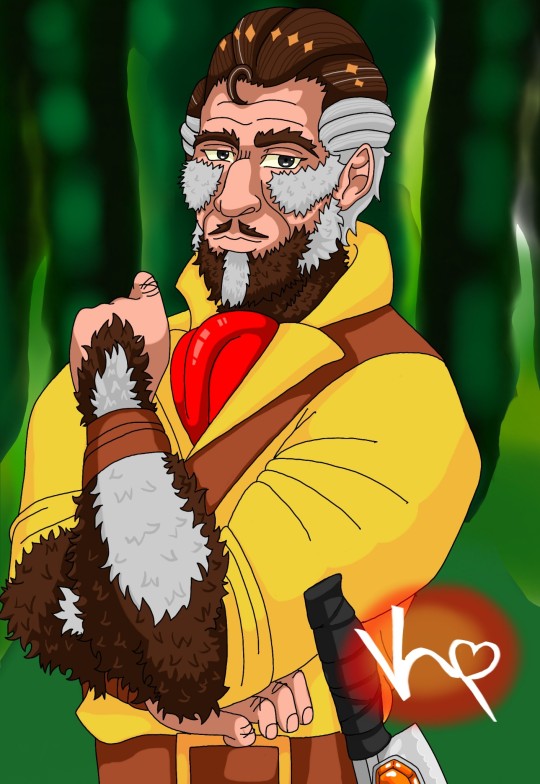
The three species were very closely bonded early on. As all three originated and evolved from select branches of the ape family, there was a kindred connection, much like how the Equine species bonded.
Sasquatch are more of the forest and jungle dwellers, the Yeti being the mountain dwellers, and Humans being plain dwellers. They formed close comradaerie and partnerships among the three species up until the species branched out to other places. After branching out, that is when magic really began to develop in species. Every species excepting Humans. Both ape species actually tried to keep their Human counterparts safe, but ultimately failed as more began to discover just how fascinating and attracting the Humans were. From there is became a losing battle for the Ape species to stay together, Humans being ripped away from their family groups to be pets or food and the few that stayed together fleeing before more could be taken.
It was Sasquatch that begged Papa Hades to take Humans under his wing in the first place, and he readily agreed.
Humans shared quite a bit of knowledge with the Yeti and Sasquatch, most of whom learned through observation, just as Humans naturally do. They kept a lot of Human crafts alive after the extinction even if they also forgot the origins of Humans as apes. Neither species felt complete after the death of Humans, all feeling the need to search for their long lost friends, even those that never met a Human. Like a piece of the trio was gone, and they couldn't stand being a duo species anymore.
Clay is a hybrid Yeti/Sasquatch. He is considered Yeti because he is much bulkier and taller than Sasquatch, who are the smaller of the two species. Usually Silverbacks are a Sasquatch only breed, but as he is outwardly built like a Yeti with the breed coloration of Sasquatch, he is considered a Silverback Yeti. He- like the other Ape species- feel a very sudden and very profound connection to Humans after rediscovering they are Apes too. Upon meeting The Human, he feels like the leader of a troupe who has just come across an abandoned infant with no mother. As the silverbacked leader, it is his duty to protect and teach this Human just as much information and skills as he learns from The Human. He also feels a kind of genetic responsibility to protect, as Humans never got the magic their other ape species counterparts did.
Many Apes of current day TWST feel responsible for the extinction of Humans, that they somehow stole the magic Humans would have gotten. It is now a heated subject on why Humans out of all species never got magic, and many eyes have turned towards the Yeti and Sasquatch people for answers they don't have. Current day Yeti tribes and Sasquatch troupes are the most vocal about The Human being returned to the other ape folk after Humans had been so brutally torn away from them by others. Their platform is gaining traction.
108 notes
·
View notes
Text

⮞ Chapter Five: Captain Disco's Last Stand Pairing: Jungkook x Reader Other Tags: Convict!Jungkook, Escaped Prisoner!Jungkook, Piolet!Reader, Captain!Reader, Holyman!Namjoon, Boss!Yoongi, Commander!Jimin, Astronaut!Jimin, Doctor!Hoseok, Astronaut!Hoseok Genre: Sci-Fi, Action, Adventure, Thriller, Suspense, Strangers to Enemies to ???, Slow Burn, LOTS of Angst, Light Fluff, Eventual Smut, Third Person POV, 18+ Only Word Count: 16k+ Summary: When a deep space transporter crash-lands on a barren planet illuminated by three relentless suns, survival becomes the only priority for the stranded passengers, including resourceful pilot Y/N Y/L/N, mystic Namjoon Kim, lawman Taemin Lee, and enigmatic convict Jungkook Jeon. As they scour the hostile terrain for supplies and a way to escape, Y/N uncovers a terrifying truth: every 22 years, the planet is plunged into total darkness during an eclipse, awakening swarms of ravenous, flesh-eating creatures. Forced into a fragile alliance, the survivors must face not only the deadly predators but also their own mistrust and secrets. For Y/N, the growing tension with Jungkook—both a threat and a reluctant ally—raises the stakes even higher, as the battle to escape becomes one for survival against the darkness both around them and within themselves. Warnings: Strong Language, Blood, Trauma, Graphic Injury scenes, Jaded Characters, Smart Character Choices, This is all angst and action and that's pretty much it, Reader is a bad ass, Survivor Woman is back baby, gardening, terraforming, some mental health issues, survivor's guilt, lots of talking to herself, and recording it, because she'll lose her mind otherwise, fixing things, intergalatical politics, new characters, depression, body image issues, scars, hate for Disco music, morally grey people, will this make us look bad as an organization?, questionable character choices as well, strong female characters are everywhere, cynical humor, bad science language, honestly all of this has probably had the worst science and basis ever, I researched a lot I promise, let me know if I missed anything... A/N: This was so much fun to write. Give me some good lore and characters and I'll eat that shit up. Sorry for the lack of good romance so far, but hopefully you guys will think the wait was worth it.
prev || masterlist || next

Aguerra Prime hung in the void like a mirage—too beautiful to trust. From orbit, it looked almost like Earth on a particularly clear day: swirls of deep ocean green wrapped in cloud-white, kissed by sunlit blues that shimmered as the planet slowly turned. But the illusion unraveled the moment you touched ground. The air had weight to it, a faint chemical tang that clung to the back of your throat, even after filtration. The oceans stretched endlessly across the surface, glistening with promise, but anyone with half a brain knew better than to get too close. The water was alive and teemed with native microbes and corrosive compounds that could dissolve human skin in minutes. Rainfall could be fatal without proper shielding. Even the soil, rich and dark in places, had to be treated before anything could grow.
Still, people adapted. They always did. Within a few short decades, colonies had pushed back against the wild terrain. Engineers built water purification towers along the cliffs. Bio-domes and coral crete cities rose along the coastal ridges, each one a careful balance of technology and caution. Life took root—hard-earned, and always on the edge—but it took root all the same. They called it New Oslo, this particular stretch of civilization: a sleek, functional city curved against the curve of a jagged coastline, looking out toward a horizon that always seemed a little too still.
And it was here, on the outskirts, that the cemetery lay.
Jemas National Cemetery sat on a plateau just above the mist-line, where the sea was visible only as a silver suggestion beyond the hills. The wind moved constantly, sweeping over rows of white stone markers in gentle, unhurried waves. The markers were all the same shape—rectangular, unadorned except for names and ranks and dates—but each one told a story that someone, somewhere, still carried.
The sky that morning was a low sheet of gray, the kind of cloud cover that blurred the light and made everything feel quieter. The ground was damp from a night of cold rain, and the air had that heavy stillness that comes after weather—when nature pauses to catch its breath.
A small crowd had gathered. No more than thirty people stood near the front rows, dressed in dark coats and muted colors, hands tucked into pockets or clasped together in front of them. No one spoke. Even the children, if there were any, kept quiet. It wasn’t the kind of silence that demanded reverence—it was the kind that happened naturally, when grief was fresh and shared.
At the center, just beneath the main flagpole where the banner of the New Oslo Coalition fluttered at half-mast, a wooden podium had been set up.
Yoongi stepped up to it with a practiced stillness. He didn’t glance at his notes—didn’t need to. His eyes moved over the crowd, not looking for anyone in particular, but acknowledging each of them all the same. He took special care not to lock eyes with her uncle, or anyone else on that side of the field.
“She was twenty-nine,” he began. His voice was clear but soft, carrying without force. “Bright. Focused. Asked too many questions. Always wanted to know why before she said yes. The kind of mind you build missions around.”
Some people nodded. Someone near the back exhaled sharply but didn’t speak.
“Y/N was one of our best crewmates. When the Hunter-Gratzner was greenlit, she was one of the first to volunteer. Not because she wanted the recognition—but because she believed in the work. In exploration. In reaching farther.”
He paused, the wind nudging the edges of his coat.
“When the ship went down on M6-117,” he said, “we lost more than a vessel. We lost a crew. We lost civilians. We lost her. And no speech will ever make that okay. It shouldn’t. This isn’t closure. It’s a marker—a place to say we remember.”
Behind him, the flag caught the wind again, the fabric snapping softly.
“But we continue,” he said. “New Oslo grows. The program moves forward. And we carry them with us. Not just in memory, but in mission. In the work we keep doing, because it still matters. Because they believed it did.”
He looked down for a moment, then stepped away without another word.
There was no music. No twenty-one gun salute. Just the sound of the wind moving through the grass, and the occasional shuffle of feet as the mourners broke apart slowly, each of them retreating at their own pace. Some walked past the headstone and placed small tokens—stones, flowers, folded notes—on the cold white marble. Others stood for a moment longer, eyes closed, lips moving in silent conversation with someone who was no longer there.
And then, gradually, the crowd thinned, until only the marker remained, fresh in the ground, surrounded by the soft hush of wind.

The Gabril Space Center was a monument to ambition—New Oslo’s gleaming centerpiece. All glass and chrome, it stood out against the overcast sky like something conjured, too sleek for a world still fighting to call itself home. Inside, the vast atrium echoed with quiet movement: engineers pacing between briefings, analysts buried in screens, the ever-present hum of filtered air and low voices carrying through the open space.
Mateo Gomez moved with purpose, his steps measured across the polished black floor. The heels of his boots tapped softly, the sound swallowed quickly by the high ceilings. Security nodded as he passed, not out of obligation, but recognition. He was someone here. Not at the top—but close enough to knock on the door.
To his left, a news feed looped silently across a wall screen. The headline crawled in red across the bottom: President Speaks at Hunter-Gratzner Memorial. Above it, the feed cut between slow-motion clips—Y/N laughing as she tumbled weightlessly through a shuttle bay, sunlight catching in her hair, then Yoongi shaking hands with the president in front of a somber crowd. Mateo didn’t look twice. The footage had been everywhere for days. You couldn’t walk a corridor without catching her face, mid-laugh, frozen in time. Grief, he was realizing, had become ambient noise in this building. No one talked about it directly, but it was in the way people walked, in the silence that lingered between conversations, in the exhaustion behind their eyes.
Yoongi’s office was at the end of the administrative wing—glass walls, high windows, and a sweeping view of the southern launch pads. The sky beyond was dull and featureless, just layers of gray pressing down over the concrete runways. He was alone when Mateo entered, seated with his back half-turned, watching the muted broadcast play across the mounted screen behind his desk.
Mateo stepped inside without ceremony and held out a slim folder.
“I thought the speech was good,” he said.
Yoongi didn’t turn right away. His hand reached back, taking the folder without looking. He flipped it open, scanning quickly.
“I need authorization for satellite time,” Mateo added.
Yoongi’s voice came without hesitation. “Not happening.”
Mateo’s jaw tensed. He wasn’t surprised, but that didn’t make it easier. “We’re funded for five Nexus missions. I can get Parliament behind a sixth—if we make Y/N’s recovery part of it.”
Yoongi turned a page, barely reacting. “No.”
“We’re getting hammered out there,” Mateo said, stepping forward. “Protests at the gates. Parliament’s dragging their feet on the new appropriations package. The Starfire crew’s threatening to walk unless they get better answers from us, and Cruz—Valencia Cruz—is done playing nice. She’s been fielding calls from half the Intercolonial press.”
“We don’t need a PR stunt,” Yoongi said, still not looking up. “We need results. Nexus II is targeting the Sundermere Basin. We’ve picked up energy signatures—unexplained. Possibly artificial. That’s where the focus is.”
“We can do both,” Mateo said. “Two objectives, one launch. All I’m asking for is eyes on the crash site. A few hours of satellite sweep. It won’t interfere.”
Yoongi finally looked up, pinning him with a sharp glance. “It’s not about interference.”
“Then what?”
Yoongi leaned back slowly in his chair, arms folded across his chest. He didn’t speak right away.
“If we so much as point a satellite at that wreck,” he said finally, “we’re rolling the dice on a media firestorm. If the images get out—and they always do—and if she’s... visible? Intact, partially intact, anything remotely identifiable? That’s headline footage from here to Earth. And we lose control of the story the second that happens.”
Mateo didn’t flinch.
His voice dropped to something low and steady, but the heat behind it was unmistakable. “So that’s it? We just look the other way? Let her rot on a dead planet because it's easier for NOSA’s public relations team?”
Yoongi’s response came hard, like a reflex. “She’s not rotting, Mateo.”
He leaned forward, elbows on the desk, gaze sharp but tired. “You know the sand on M6-117 acts like a thermal buffer. Once she’s under, the surface temperature plummets. Radiation drops. Wind scours the top layer clean. She’s probably preserved better than anything we’ve ever brought back in a sample container. But that’s not the point.”
He rubbed a hand over his face, exhaling through his nose.
“If someone gets footage—anything, even grainy—of what’s left of her... charred, exposed, half-eaten—do you understand what happens next? That becomes the image. Not her work, not her dedication. That.” He tapped the desk once, firm. “And then it won’t just be about Y/N anymore. They’ll turn on us. They’ll ask why we greenlit a civilian-led mission without making sure access to Shields wasn’t shut off sooner. Why the automated course correction failed. Why NOSA sent their golden girl into what’s now being called an ‘unmapped danger zone’ by half the media outlets out of EarthGov.”
He stood abruptly and walked to the window, voice flattening as he looked out.
“They’re already lining up hearings in the Science Oversight Committee. NOSA’s funding is getting picked apart by three subcommittees. The EU bloc wants our Sundermere data classified until they’ve ‘evaluated its economic potential,’ which is code for: 'we want a piece of it.’”
Mateo’s mouth tightened. He’d heard some of that too—leaks coming from the Earth-side delegation, whisper campaigns starting in defense circles. Even the South American Consortium, which usually stood by NOSA, had gone quiet.
Yoongi kept going. “We release one image of that crash site, and the narrative shifts. It stops being about science. It becomes a political mess. Parliament will freeze funding. The Americans will yank their comms array support. And don’t think for a second the Lunar Coalition won’t swoop in to take the Sundermere Basin off our hands.”
He turned back, face lined with the weight of too many choices. “We don’t just lose Y/N. We lose everything.”
Mateo didn’t speak for a long time. His jaw was tight, his breath uneven like he was trying to wrestle something down inside himself before it came out the wrong way.
Finally, he said, quietly, “She was everything.”
Yoongi didn’t respond. He stared out past the desk, past the room, past everything. Mateo kept going, his voice lower now. The heat had drained out of it, leaving something heavier—guilt, maybe, or shame.
“She wasn’t just a solid astronaut. She was the astronaut. Everyone wanted her on their crew. She stayed late to double-check other people’s numbers because she didn’t want anyone getting hurt. When the Gratzner protocols started falling apart mid-flight during test flights, she didn’t panic—she rewrote them in real time, while the rest of the crew was trying not to pass out from pressure drops.”
He shook his head once, eyes distant. “She was the best botanist we had. Not just because she could ID a plant by sight—on three different planets—but because she remembered every soil variant, every gas pocket, every light-cycle condition that might screw up a grow. And then on top of that, she took flight training so she could back up a pilot in an emergency. Who does that?”
Yoongi said nothing, his jaw working like he wanted to say something but couldn’t quite get it out.
Mateo watched him. “She respected you. You trained her. You went to bat for her when she got passed over the first time. And when the Gratzner crew got shuffled last-minute, she didn’t hesitate—she switched assignments with you. So you could stay back and stabilize Nexus scheduling. She did that for you.”
Yoongi’s shoulders tensed slightly, barely perceptible—but it was there. Outside the office windows, the fog hadn’t lifted. It moved in slow currents over the landing field, softening the harsh outlines of the launch towers. Launch Pad 4 stood at the far end, silent, skeletal, waiting.
Mateo’s voice dropped further, now close to a whisper.
“She’s still up there. No body. No grave. No closure. Just a name on a rotating wall display and a headline that gets smaller every week. People walk past that screen like it’s just background noise. Like she’s already fading out.”
Mateo let out a quiet breath and gave a small, lopsided smile—one of those half-formed expressions that came with memory.
“You remember French Fry?”
Yoongi blinked, caught off guard. He turned slightly, eyes narrowing in thought. “The support drone? The one Dr. Nguyen built to assist with nutritional diagnostics?”
Mateo nodded. “Yeah. The one that kept trying to back itself into the convection oven.”
Yoongi let out a low, almost reluctant chuckle. “Right. Quinn said it was fitting. Said she named it after Y/N because it was brave and always in the wrong place.”
Mateo smiled a little wider. “She wrote that letter to engineering—pretending to be French Fry’s lawyer. Filed a fake complaint against the entire culinary systems team. ‘Negligent appliance zoning resulting in repeated suicide attempts.’ She even cited precedent. You laughed so hard you snorted coffee all over your tablet.”
Yoongi looked down and gave a small shake of his head. “I made her rewrite it three times. Just so we’d have copies.”
A flicker of something softened his face—nostalgia, grief, maybe both—but it faded almost as quickly as it appeared.
“She’s not forgotten,” he said, voice tight at the edges.
Mateo studied him. “Then stop acting like she is.”
Yoongi turned back to the window, arms folded tightly over his chest. The fog outside had thickened, curling around the perimeter lights like smoke. The towers stood still and sharp in the distance, black shapes against a washed-out sky.
Yoongi’s shoulders shifted—barely—but Mateo caught it. He knew the signs. Something had landed.
“She was my friend too,” Yoongi said, finally. His voice was quiet, but there was no doubt in it. “I watched her go from a kid who couldn’t even lock her pressure collar without double-checking the diagram, to a mission lead who had half the command wing checking their math twice because she was just that fast. That sharp.”
He paused, looking down at the floor like the memory was playing out there in front of him.
“She wasn’t just ahead of the curve. She was right. Consistently. The scary kind of right, where people stop arguing even when she’s the youngest one in the room. Not because they’re giving up—but because they know she already figured it out.”
He looked up again, met Mateo’s eyes—really met them—for the first time in a long while.
“And yeah,” he said. “I owe her. I didn’t ask her to take my place. I told everyone I was going, locked the schedule myself. But she knew. She always knew when I was lying, even when I thought I wasn’t.”
He let out a dry breath, more exhale than laugh.
“Somehow, she talked that stone-faced bastard Osei into signing off on the reassignment behind my back. I didn’t even know until I found the note in my locker. All it said was, ‘I trust my crew more than you trust yours. I’ve got this. You’ve got work to do here.’”
A flicker of something passed across his face—pride, maybe, or just the hollow ache of being known too well by someone who was now gone.
“That was her,” Yoongi said, voice quieter. “Always a step ahead. Always taking the harder hit if it meant sparing the rest of us.”
Mateo started to say something, but Yoongi held up a hand—not to cut him off, but just to finish his thought.
“I’m not being cold,” Yoongi said. “I’m being realistic.”
He exhaled, rubbing his palms together like he was trying to keep them from shaking. “Nexus II is barely holding. EarthGov’s budget committee is sharpening knives. Half the Parliament’s ready to gut interplanetary funding if it means buying more leverage back home. We’ve got maybe one window left. One shot at Sundermere before the politics close in.”
He gestured toward the fog-draped launch field outside, where the towers sat dark and skeletal.
“That crater isn’t like the rest of the planet. Wind systems don’t match surrounding patterns. The thermal shifts, the power readings—we’ve never seen anything like it. Eastern ridge is lighting up magnetically. We’re seeing what could be frozen permafrost below the crust—something wet down there. And the biosigns from the last probe? If those weren’t just sensor ghosts, we could be sitting on proof of subsurface life.”
He turned back to Mateo, the weight in his voice unmistakable now. “You know what that means. Terraforming viability. Real colonization. Not domes. Not provisional crews hoping the bioraptors don’t punch through the fences at night. Actual reclamation.”
He looked tired. Not the kind of tired that came from long nights, but the kind that came from too many decisions like this one. “We can’t afford to screw this up. We lose this shot, and M6-117 goes dark. For good. No follow-up. No second wave. Just another failed world buried under bureaucracy.”
Mateo didn’t move. He didn’t argue. He just spoke, calm and deliberate.
“I’m not asking you to risk the mission, Min.”
He stepped closer, closing the gap between them—not confrontational, just steady.
“I’m asking you to write her in. Quietly. Secondary objective, folded into the atmospheric sweep. No flags. No fanfare. Just one pass over the Gratzner wreck. If we get nothing? Fine. But if we see anything—something clear, something dignified—then maybe we give her family more than a looping photo and a footnote in the archives.”
He let the silence hang for a beat, then added, gently, “We’re not chasing ghosts. We’re just trying to finish the story. Close the chapter that never got an ending.”
Yoongi sat back down slowly. The motion looked deliberate, like every joint had to agree to move.
He tapped the armrest once, then stilled.
The quiet that followed wasn’t tense. It was thick. Heavy with memory. The kind of silence that only came after too many years spent carrying too many names.
Mateo didn’t press. He’d known Yoongi long enough to understand his rhythms. He didn’t rush decisions. He let them settle. Let the silence test their weight.
Outside, the fog pressed harder against the windows, thick and unrelenting. The field lights cut through it in faint, useless beams—small cones of visibility swallowed by the gray. The launch towers sat still in the distance, silhouettes fading at the edges like ghosts.
Inside, the soft flicker of the memorial screen lit up the far corner of Yoongi’s office. The same reel, still looping.
Y/N drifted across the frame, weightless, laughing—caught mid-spin inside the Gratzner’s jump bay. Her hair floated around her like silk in water, her limbs relaxed, fluid, untethered. She looked effortless. At ease. Like she belonged up there. Like space had always been hers.
For a second, Mateo forgot where he was. She didn’t look like someone they’d lost. She didn’t look like a name carved into polished stone. She looked like the version of her that used to barrel into early-morning briefings, still half-wired on caffeine and a new theory about bioreactive algae in thin atmospheres. Tablet in one hand, no fewer than four open windows of data stacked across it. Half the time, she was already arguing the point before anyone else had sat down.
She never waited to be asked. She never needed permission.
She just moved—with purpose, with momentum—and dared the rest of the room to catch up.
Then the image on the screen blinked away.
Her official portrait replaced it: eyes forward, hair pulled back, lips in a neutral line. The uniform was crisp. The Coalition flag blurred in the background like a watercolor made of shadow.
Remembering the Crew of the Hunter-Gratzner.
Mateo stared at it. The screen. The text. The way it tried to tidy her into something easy to mourn.
It felt false. Not a lie—but not the whole truth either. Too polished. Too clean.
He could still hear her voice, and not in a nostalgic, far-off way. It was clear. Immediate. Frustrated and full of fire.
He imagined if it had been Jimin Park left on that wreck, or Armin Zimmermann. Y/N wouldn’t be standing in an office, tiptoeing around politics. She’d already be halfway down to satellite ops with a backdoor login and a hard case full of signal boosters.
She’d have that look—mischievous, sure, but dangerous too. Like she knew exactly how many rules she was about to break, and had already decided they weren’t worth following.
And she’d smile, that crooked, knowing smile, just before she said it:
“Fuck bureaucracy.”
Mateo exhaled a breath that was somewhere between a laugh and a sigh. He didn’t mean to smile, but it came anyway. It was small, worn at the edges, but it was real.
Because that was her. All of her.
And the truth was, she wouldn’t have just gone after the data—she’d have dragged him along with her, even if it meant putting both their jobs on the line. And he would’ve gone. Without hesitation.
Because she would’ve done the same for him.
And that, Mateo thought, was the point. That was why this mattered.
Behind him, the silence stretched a few seconds longer—until Yoongi finally spoke.
His voice was quiet. A little rough. But steady.
“Go for it.”
Mateo turned, not sure he’d heard him right.
Yoongi didn’t look away from the window, but he nodded once.
“Have April Borne take a look. She’s smart. Discreet. Doesn’t scare easy.”
He paused.
“Get the orbital pass scheduled. Quietly. If there’s a clean window, I want her running the image enhancement—no chatter, no metadata tags. I want to know what condition Y/N’s in before we even think about next steps.”
Mateo nodded. Slowly. He didn’t say thank you. That wasn’t how they worked.
Yoongi leaned back in his chair and let out a long breath, the kind that had been sitting in his chest for hours. Maybe days.
Mateo turned toward the door, ready to move. But he stopped just before stepping out, his hand hovering near the panel.
“Min,” he said quietly, glancing over his shoulder, “this doesn’t change anything about Sundermere. We do the work. We follow through.”
Yoongi looked up, met his eyes.
“I know,” he said. “But we don’t leave her behind if we don’t have to.”
Mateo gave a small nod, then walked out.
Behind him, the door slid shut with a soft hiss. The memorial reel began again—Y/N caught mid-laugh.

April Borne leaned back in her chair, the tension in her shoulders barely easing as she stretched. It was late—closer to early morning, really—but the satellite ops floor was still lit, still humming with quiet, steady life. The room was mostly empty now. Just her, two unmanned desks, and the soft thrum of servers overhead.
She turned her attention back to her screen.
A new work order had come in. That wasn’t unusual. NOSA’s satellite grid ran constant, and last-minute data requests came through all the time—environmental sweeps, storm modeling, orbital drift corrections. But this one was flagged priority access, and the requestor name gave her pause.
Gomez, Mateo.
Her brows pulled together.
It wasn’t that unusual to see an exec’s name on a late pull—especially someone with Mateo’s clearance—but something about it felt… off. Not wrong, exactly. Just heavier than usual.
She scanned the attached coordinates.
Virelia Planitia.
April Borne leaned forward, eyes steady on the screen as she keyed in the coordinates. She spoke the name aloud without thinking—softly, to herself.
“Virelia Planitia.”
Her voice barely rose above the background hum of the satellite control center. The name settled uneasily in her chest. It tugged at something. Familiar, but not quite present. Like a dream half-remembered or the tail end of a story you weren’t supposed to hear.
She frowned, tapped a few commands into the interface, and dragged the scan window to cover the last ten hours. High-res sweep. Shadow filters on. Wind distortion compensation running. She hit ‘execute’ and waited.
The feed loaded slowly—one frame at a time, each one rendered from hundreds of kilometers above the surface. The first image came into view.
April straightened a little in her seat.
The terrain was flat, dry, and empty. That harsh, burnt-red shade she’d come to associate with M6-117. At first glance, it looked like a thousand other scans she'd run. But then the structure emerged—off-center, slanted slightly, one edge half-swallowed by windblown grit.
She leaned in.
The main habitat shell was still there. Warped, battered, but intact. One of the secondary units had collapsed entirely—just a heap of buckled alloy. The solar arrays were bent at sharp angles. Two were missing. The comms rig looked fried—its base blackened and skeletal.
But even from this distance, something about it looked wrong.
April’s fingers hovered over the keyboard as she stared.
And then it clicked.
She knew this place.
Not personally, but in the way everyone at NOSA knew it—through internal reports, redacted footage, and that cautious silence that always settled in when the Gratzner was mentioned. The crash site. Y/N’s mission. The one they stopped talking about once the press coverage turned invasive.
Why the hell was Gomez pulling visuals on it now?
She adjusted the contrast, enhanced the light angles, and let the AI sharpen through the wind smear. More images filtered in. No movement. No heat signatures. No visible wreckage outside of what she’d already seen.
And no body.
No gear. No emergency markers. No personal effects scattered on the sand. Just the cold outline of a structure long abandoned.
April checked the coordinates again. Ran a depth overlay. The sand patterns showed recent shift, but nothing major. A few centimeters of coverage at most. Enough to bury light debris, maybe, but not a person. Not if they were still out in the open.
She felt a slow chill settle in her chest. There was nothing here.
No proof of life.
But also… no proof of death.
She saved the clearest frames, tagged the metadata, then paused—hovering over the folder name before clicking ‘Secure Archive.’ Just clean, time-stamped data. No notes. No assumptions.
Then something stopped her.
April blinked. Sat back slightly. Let the frame reload.
She rewound the sweep by ten seconds, held her breath, and froze the feed at the right angle. One image, high-altitude, but clear enough. She zoomed in—slowly, carefully—until the detail sharpened.
Solar panels?
She frowned. That wasn’t unusual by itself, not on a planet littered with old equipment and failed expeditions. But these… they were intact. Fully mounted. Angled just right to catch the light. And clean.
Not just visible through the dust—clean. Polished. Reflective.
Her stomach tightened. That didn’t track.
M6-117 was one of the worst environments NOSA had ever sent people into. The storms didn’t come in seasons; they came constantly. Fine red grit moved like static electricity, clinging to everything. Even low-orbit observation satellites picked it up as visual noise. Nothing stayed clean there.
But these panels—wherever they came from—weren’t just clean. They were in good condition. Better than good. Better than possible.
She leaned in again, squinting at the feed.
No scorch marks. No structural collapse. No wind shear damage. No burn-off. And most of all, no way in hell they should be anywhere near the Gratzner wreck.
The geology teams had placed their equipment miles to the west, near the old settlement edge. These were nowhere near that. These were close—too close—to the coordinates of the crash site.
She checked the registry again. No update. No new deployments logged. No ops schedules submitted. No teams down there. Nothing on file.
Her hand hovered over the mouse. The air felt suddenly too thick in her lungs.
It didn’t make sense.
Not unless…
A cold sensation moved across the back of her neck. Not fear, exactly. But a kind of awareness. The sharp-edged kind that told you, with absolute certainty, that you’d just stumbled into something no one meant for you to see.
“Oh God,” she whispered.
The words left her before she’d even registered saying them.
Her hand went for the phone. She knocked it off the cradle in her hurry, caught it before it hit the floor, then slammed it back onto the desk and jabbed in the code for internal routing. Her fingers felt clumsy. Cold.
The line clicked.
“Security,” came the voice on the other end, flat and bored.
“April Borne,” she said quickly, her breath not quite under control. “Satellite Control. I need Dr. Mateo Gomez’s emergency contact. Right now.”
There was a pause. The kind where someone checks credentials before pushing the big red button.
“Yes,” she snapped, “him. It’s urgent.”
As the operator responded, April barely heard the words. Her eyes were still locked on the image. On those panels. On the sunlight reflecting off metal that should’ve been buried beneath half a meter of dust by now.
She didn’t know what she was seeing.
But it wasn’t nothing.
And whatever it was… it hadn’t happened by accident.
The line crackled once, then went quiet.
April stared at the monitor as the call transferred. Her knee bounced beneath the desk. She didn’t even realize she was doing it.
There was a pause—three rings, four—then a tired voice answered, low and groggy.
“This is Gomez.”
April straightened in her seat automatically. “Uh—Dr. Gomez? This is April Borne, I’m in Satellite Control. Sorry. I know it’s late.”
There was a beat of silence. She could hear the shift in his breathing, that sudden tension that hits when someone wakes up mid-sentence and knows something’s wrong before you say it.
“You’re calling from SatCon?” he asked, voice already sharpening. “What’s happened?”
April swallowed. “You… you requested a sweep over Virelia Planitia. I pulled the footage. I was just running it through standard filters, but something came up.”
He was fully awake now. She could hear movement—sheets, maybe. The dull thud of feet hitting the floor.
“What kind of something?”
She hesitated—not because she didn’t know how to explain it, but because part of her still wasn’t sure she believed what she’d seen. “There’s solar paneling near the crash site. New-looking. Clean. Fully intact. Reflective enough to bounce a glare off the satellite lens. That’s not standard equipment for that zone. I double-checked against our infrastructure maps—there’s nothing logged for that sector, and the geology team didn’t build that close to the wreck.”
“Any activity?” he asked. “Movement? Heat signatures?”
“No. Everything looks dead. But the panels are positioned perfectly. They’ve been adjusted. Recently. They’re too clean for anything natural to explain it.”
The line went quiet again for half a beat.
Then: “You didn’t tag the data?”
“No. Just stored three clean frames to a secure archive. No labels. No flags.”
“Good,” Mateo said. “Stay there. I’m going to call the director. We’ll loop you back in once we’ve figured out next steps.”
He hung up before she could respond.
Mateo was already halfway into a clean shirt, one hand pressing his phone to his ear as he paced across the narrow strip of carpet in his quarters.
Yoongi picked up on the second ring.
“It’s me,” Mateo said. “Wake up. We’ve got movement at the Gratzner site.”
There was a pause on the other end. A sigh, maybe. But not confusion. Not disbelief. Just that heavy exhale Yoongi gave when he knew a night was about to get longer.
“I’m listening,” Yoongi said.
“She caught something on the last sweep—clean solar arrays, set up near the wreck. They’re in active orientation and fully intact. Way too clean to be left over from the crash.”
There was a short silence, then: “You sure it’s not leftover equipment from geology?”
“Already checked. Placement’s wrong. Too close. And it doesn’t line up with the last terrain integrity scans. She’s good, too—didn’t tag the frames. Kept it quiet.”
Yoongi was quiet for another second.
Then: “Loop her in. I want a direct line. No chatter. No routing through the board.”
“I’m already on it.”
Mateo hung up, grabbed his tablet, and keyed in the SatCon line again.
April answered on the first ring, breath caught somewhere between relief and panic.
“Dr. Gomez?”
“April. I just got off with the director. You’re cleared to send the frames. Full-resolution, no compression. Direct to me, then back it up on an external drive—don’t touch the servers again until I give you the go. Understood?”
“Understood,” she said quickly.
“I know this is probably not what you expected when you signed on,” he added, voice a touch softer now. “But you handled this the right way. We don’t get a lot of clean threads in situations like this. You just gave us one.”
There was a pause on her end. “Do you think she’s still alive out there?”
Mateo didn’t answer immediately.
“I don’t know,” he said finally.

Thirty minutes later, Mateo Gomez stood in the center of NOSA’s mission control floor, surrounded by quiet urgency. The room was dim but alive—screens flickering, feeds updating in real-time, the soft clicks of keyboards like rainfall on glass. A satellite image of M6-117 glowed across the central display, the barren red landscape stretching outward around a single, unmistakable structure: the Hunter-Gratzner’s crash site.
Alice Saxe, Director of Media Relations, stood just behind him, arms folded, heels echoing as she paced.
“Tell me I’m wrong,” she muttered. “Please. Tell me I’m looking at an old sweep or some kind of glitch.”
Mateo didn’t respond right away. He just turned back toward the monitor, pointing.
“Panels have been cleaned. Adjusted for sunlight. This isn’t weather. You know that.”
“Dust storms on M6-117 don't clean—they scour,” Alice said. “If the wind had hit those arrays, they'd be torn to shreds or buried. Not gleaming.”
Yoongi Min stepped closer, still in his travel jacket, his face unreadable. He hadn’t spoken since entering the room, but his silence was the kind that pulled everyone’s attention without asking for it.
“How certain are we?” he asked finally, voice low and steady.
“Ninety-nine percent,” Mateo said. “We cross-checked the coordinates. The battery Y/N removed from the Gratzner on Sol 17 was logged dead, but this panel—this entire array—has been relocated and is drawing ambient current.”
Yoongi stared at the display wall, eyes locked on the satellite footage. His jaw tightened, but he didn’t speak. Not yet.
Mateo stepped forward and tapped the screen again, bringing up the enhanced overlay. “Look at this,” he said. “This isn’t erosion. This is structure modification. The H-G’s been partially disassembled. You can see where the supports were moved. That’s not decay. That’s work.”
Alice, standing just behind them, stopped pacing. Her heels had been a steady rhythm of tension, but now she went still.
“Someone’s there,” she said, voice quiet.
“Or was,” Mateo replied. “But whatever this is—it’s recent. That site’s not dead. It’s active. Or it was, at least, in the last seventy-two hours.”
Yoongi’s brow furrowed. “That old cargo hull from New Mecca—the one that dropped signal last year. Could she have found it?”
“We thought about that,” Mateo said. “And maybe she did. But if she’s using it, it’s not for communication. There’s no distress signal, no coded pulse, nothing on open channels. Our guess? She stripped it for power. Kept what she needed to survive and stayed dark. She’s rationing.”
Yoongi’s mouth opened slightly—he was about to say something—but Alice beat him to it.
“If she’s alive,” she said, stepping forward, her voice low but urgent, “if Y/N is actually alive out there, someone on Nexus II needs to know. Her cousin’s on that ship, Yoongi. You know that.”
Yoongi turned to her, his tone calm, but threaded with steel. “We’re not telling them.”
Alice stared at him, eyebrows raised. “You can’t be serious.”
“I’m dead serious,” he said. “We keep this contained.”
“For how long?” she asked, incredulous. “Until she runs out of food? Until someone leaks the satellite footage and the public gets there first?”
“They’re eight months out from New Mecca,” Yoongi said. “Ten from reentry. We hit them with this now—with this? We don’t know what that does to the crew. To him.”
“They already buried her,” Mateo said quietly from across the room. “Held a private vigil in the observation deck. And now we’re going to rip that away from them—with no rescue window? No extraction plan?”
He looked up, meeting Alice’s eyes. “Jimin Park’s been holding that crew together since day one. He’s not just her friend, Alice. Her uncle adopted him after she brought him home. They’re practically siblings at this point. You think he won’t try to reroute the mission himself?”
Alice looked between the two men, then back at the screen where the crash site stood frozen in grainy satellite stills. Her arms slowly folded across her chest.
“So we just let them believe she’s dead? Again.”
Mateo didn’t answer, but his silence said enough. Yoongi took a breath.
“We hold the line,” he said. “Until we know she’s stable. Until we know this isn’t a glitch. A mistake. Or worse—something we can’t fix.”
This time, Alice didn’t argue. Not because she agreed, but because the logic—cold and cruel as it was—held.
She rubbed at her temple and nodded once. “Parliament’s going to eat us alive. I spoke to Oversight this morning. Image data clears internal review in twenty-three hours. Once it does, it’s public record.”
“Then we get ahead of it,” Yoongi said. “We don’t let this leak through the back door. We put out a statement. Brief, clear, controlled.”
Alice looked at him flatly. “Right. Something like: ‘Dear people of Aguerra, you know that young pilot we gave a state funeral? Turns out she’s alive and living on protein paste in a desert crater. Oops. Love, New Oslo.’”
Mateo didn’t laugh. Neither did Yoongi.
The tension in the room didn’t allow it.
Mateo’s eyes were fixed on the satellite feed again. The structure sat quietly in the frame, unchanged and unmoving—just a tiny silhouette against endless red. A single, skeletal lifeline in an ocean of dust.
“This wasn’t supposed to be possible,” he murmured. “We reviewed every survival scenario. Every thermal failure point. Ration shelf-life. Physical trauma after impact. We mapped it all. And still…”
Still, she was alive.
Yoongi moved toward the chair by the wall, where he’d dropped his jacket earlier, and slid his arms into the sleeves.
“I’m going to Helion Five.”
Mateo looked over, confused. “Why?”
“She has family there,” Yoongi said. “Her aunt and uncle emailed me last night saying they were going to see them. They’re hosting a memorial tomorrow—small, just close relatives. They don’t know what we found. I’m not letting them hear about this from a newsfeed. When they get back here they need to be prepared to face the news.”
Alice’s tone softened. “If she’s alive, they’ll be relieved.”
Yoongi paused at the doorway. His voice was lower now, almost flat. “Relief depends on what we find next. All we’ve got are images—no movement, no signal, no confirmation. If she is alive, then we’ve got six weeks of rations left to work with. Maybe less. And that’s not accounting for muscle atrophy, radiation, psych strain. A year in M6-117’s gravity at surface level... even if she’s standing, she’s not strong.”
Nobody responded.
The weight of it pressed into the room.
The monitors kept humming. Soft alerts blinked on screen—routine, irrelevant. And yet the atmosphere felt anything but ordinary.
Mateo finally broke the silence. His voice wasn’t loud, but there was something in it—something fragile and steady at the same time.
“Can you even imagine what she’s been through?” he asked. “What it’s like waking up to that sky every day. Knowing no one’s coming. Hearing your own breathing and nothing else. Watching the light change and wondering if that’s your last sunrise.”
Alice didn’t respond. She just stared at the image, arms still crossed. Her jaw was clenched tight.
Yoongi followed Mateo’s gaze back to the screen. He didn’t speak right away. When he finally did, his voice was quieter than either of them had ever heard it.
“She thinks we gave up,” he said. “She thinks everyone walked away.”
He didn’t look at them when he said it. He just stared at the image—at the wreck, the clean panels, the threadbare hope they’d uncovered far too late.
“And she’s probably right.”
No one corrected him.
No one even moved.

The planet’s surface shimmered through the thick, dust-streaked viewport like a mirage, a fluid illusion of red and gold under the hard light of three suns. M6-117 had never just been a planet—it was a crucible. A punishing, relentless force that didn’t care about the limits of human endurance. It didn’t roar. It didn’t lash out. It just endured, and made you suffer for trying to do the same.
The wind outside never really stopped. It howled sometimes, hummed at others, but it was always there—scraping sand against the Hab walls like claws against a coffin lid.
Inside, things weren’t much better.
The air recyclers wheezed rhythmically in the corner, fighting a losing battle against the heat and the grit. Everything smelled faintly of copper, sweat, and the unmistakable tang of fried wiring. Every square inch of the Hab was claimed by something—wires, taped-together filters, stripped-down equipment, makeshift solar controllers, and the skeletal remains of old repairs that had failed just long enough ago for her to stop cursing them daily.
And cutting through all of it, like some absurd joke the universe refused to stop telling, was Vicki Sue Robinson.
“Turn the Beat Around” blared cheerfully from the corner speaker. The volume had long since stopped being adjustable—another casualty of the power surge two weeks ago. The computer, apparently, had decided that disco was essential for morale.
Y/N sat cross-legged on the floor, surrounded by the chaos. Dirt smudged her cheeks and collarbone. Her jumpsuit, once standard-issue and crisp, had been patched so many times it looked like a quilt. Her hair was pulled back into a crooked, low bun, strands slicked to her forehead with sweat. She was pale beneath the grime, hollow-eyed and hollow-cheeked, but awake. Alert. Still breathing.
The camera was on, its tiny red light a familiar companion. She looked directly into it, her face unreadable for a long moment.
Then she spoke.
"I'm gonna die up here."
The words were delivered flatly—no drama, no fear. Just fact. A statement she'd repeated enough times to wear smooth.
She paused, then gestured vaguely toward the speaker, where the disco beat continued its unforgiving march.
“…if I have to listen to any more goddamn disco.”
Her voice cracked slightly, and for a second it was hard to tell if she was about to laugh or lose it. She went with sarcasm.
“Jesus, Captain Marshall,” she muttered, leaning back against the wall and closing her eyes briefly. “You couldn’t have packed one playlist from this century? It’s like being trapped inside a time capsule designed by someone’s dad during a midlife crisis.”
She opened her eyes again and tilted her head toward the camera. Her mouth curled into something that could’ve been a smile, if not for how tired her eyes looked.
“I’m not turning the beat around,” she said dryly. “Not today. Not tomorrow. Not ever.”
The music played on, oblivious to her suffering. And for a while, she let it. Just sat there, letting the thumping bass fill the silence she no longer had the energy to fight.
Her gaze drifted around the Hab. The exposed wiring. The jury-rigged cooling coils. The last two nutrient packs, stashed carefully in a corner and rationed down to sips and guesses. Everything here was improvised, fragile, a monument to survival one piece of duct tape away from collapse.
Her tone shifted when she looked back at the camera again. Softer now.
“You know,” she said, brushing a dirty hand across her forehead, “I used to hate noise. Back on Helion Five, I thought silence was peace. I'd take long walks just to get away from everything. Loved the stillness—the wind across the glass domes, the sound of my own footsteps. It felt clean. Safe.”
She exhaled through her nose. It wasn’t a laugh exactly, but something close.
“Now I’d give anything for a little chaos. A toddler screaming at the top of their lungs. Some teenager blasting synthpop out of a cracked speaker on the transit line. My Aunt Rose laughing way too loud at one of Uncle Sean’s awful cooking puns. Jimin calling me just to argue about who’s faster in a sim run. I’d take any of it.”
Her eyes glistened slightly, but she didn’t blink. She wasn’t going to cry. Not today. Not yet.
“But no,” she added with a half-hearted shrug. “Instead, I get this. Captain Disco’s Last Stand.”
She waved toward the speaker, now cycling into another painfully upbeat track. It might’ve been Bee Gees. She honestly couldn’t tell anymore. It all blurred together.
“Thanks for that, Cap,” she said, voice cracking just enough to be heard.
For a while, she didn’t move.
Y/N just sat there, her arms draped loosely over her knees, fingers slack, her body sagging under the weight of heat and fatigue. The music played on in the background, cheerful and relentless, as if completely unaware it was serenading a graveyard.
Her face hovered somewhere between disbelief and resignation—eyelids heavy, mouth drawn tight, eyes glassy but dry. Like she couldn’t decide whether to laugh or scream, and had settled instead on stillness.
Eventually, she exhaled through her nose. A slow, weary breath. The kind that didn’t relieve anything but bought her one more second of not falling apart.
She straightened a little, not with purpose, but out of habit. Pushed her shoulders back. Wiped at her face with the back of one dirty sleeve. Sniffed. Brushed a clump of red dust off her jumpsuit—pointless, really, but it made her feel slightly more like a person.
Still not crying.
“Anyway,” she murmured, her voice rough but steady. She cleared her throat. “Guess I should get back to it.”
She glanced to the small diagnostics tablet lying on the crate beside her. One of the few pieces of equipment still fully functional, thanks to two days of rewiring and one desperate bargain with a soldering gun.
“Filters are holding at sixty-three percent. And the east panel’s… yeah, losing charge again. It dips below thirty, I lose the A/C circuit. Which means no airflow. And considering it’s been climbing ten degrees at dusk every cycle—”
She didn’t finish the sentence. She didn’t need to.
She looked up at the camera again, her gaze settling on it like she was seeing through it, not just into it.
For once, she wasn’t performing. She wasn’t trying to document for science, or for protocol, or even for the off chance some bureaucrat in a clean uniform might review the footage someday. She was talking like the way people do in the dark, to themselves, when they need to say something out loud just to believe it.
“I know no one’s watching this live. Not anymore. I stopped pinging outgoing signals after the relay failed on Sol 117. Probably should’ve done it sooner. No point wasting power on a message no one’s receiving.”
Her voice caught, just a little, but she pushed through it.
“I know it’s all getting logged somewhere. Maybe. If the system hasn’t corrupted yet. Maybe it’s already lost. Maybe this is just talking into the void.”
She shrugged faintly, the gesture brittle.
“But if you’re watching this someday... if you’re here, and you found this place—first off, congrats. You made it farther than anyone ever expected.”
She hesitated. Her gaze drifted toward the speaker again, where the music was cycling into another track—something fast, with horns, absurdly upbeat.
“And second... turn the music off. Please.” Her smile was thin, cracked at the corners. “Do that one thing for me.”
She didn’t laugh. It was too dry for that. But something about the absurdity, about the sheer persistence of disco as a background to slow starvation, made her eyes crease with irony.
“Seriously,” she said. “You survive a crash. A storm. A breach. You figure out how to repurpose three dead batteries and a solar sled with two legs and a dream. And your reward? Is nonstop seventies dance hits and a broken coffee machine. Just... poetic.”
The camera light continued to blink, silent and impassive.
Y/N leaned forward slightly, fingers brushing the panel beside the lens. Her expression didn’t shift much, but her eyes lingered.
“I don’t want to die here,” she said finally, her voice low. Steady. “But if I do... just let it mean something. Let it matter. Not in the reports. Not in the mission logs. Just... to someone.”
She hovered there a moment longer. Like part of her still thought maybe—maybe—someone was out there watching. That someone might say something back.
No voice answered.
She reached out and tapped the switch.
The camera blinked off.
The silence that followed felt heavier than it should have. Not total, not complete—disco still played, faint and fuzzy through the corner speaker. But it no longer had anything to talk over.
Outside, the wind moved across the open plain, dry and sharp, dragging the planet’s endless red dust in slow waves across the wreckage.
Inside, Y/N pulled herself to her feet with a small grunt. She cracked her neck, wiped her palms on her thighs, and moved toward the power grid diagnostics. Her fingers worked on autopilot, adjusting output thresholds, checking the panel logs, splicing a broken wire.
The work was hard. The air was thin. The gravity pulled harder every day.
But she did it anyway, because surviving wasn’t something you did all at once. It was something you did a little at a time.
And that was exactly what she did.

Y/N sat hunched over the workstation, elbows braced, head bowed, the soft mechanical hum of the Hab wrapping around her like a half-remembered song. It was the kind of ambient noise you stopped noticing after the first few days—until it changed. And then, you couldn’t unnotice it. Every now and then, a subtle click or muted groan would echo through the walls. Nothing critical, according to the diagnostics, just thermal shifts or aging components settling in their housings. Still, every sound tightened her chest for half a second, her eyes darting upward, ears straining. Alone out here, you learned to take every anomaly personally.
Outside the small viewport, M6-117 lay still and inhospitable. Just more of the same: a rust-colored expanse, baked flat and cracked like old pottery, broken only by distant ridgelines that shimmered faintly in the perpetual twilight. The sun didn’t really set on this planet—it dimmed, sulked low, and hovered just below the edge of the horizon in a long, bruised dusk. The sky was always the color of dried blood.
She rubbed the side of her head, trying to ease the throb pulsing just behind her right eye. The recycled air was running too dry again. She could taste it—metallic, sand-scrubbed, stale. The CO₂ scrubber was overdue for recalibration, but she didn’t have the right calibration beacon anymore. It had corroded, probably during the last atmospheric pressure swing. So instead, she rationed deeper breaths and kept going.
On the desk before her, a battered old map lay flat beneath two metal clips. She'd found it weeks ago, buried in the remains of a modular crate in the collapsed outpost 11.3 kilometers south. Miraculously intact. The paper was faded and fragile—yellowed along the folds, edges torn like old lace—but the lines were still there, hand-drawn in black ink: contour lines, elevation notations, faint topographic notes in a steady, meticulous script. Whoever made it had cared. Had known this land in a way she still couldn’t.
Her fingertip traced a route from her current position—just north of the crater shelf—toward the ridge to the east. The terrain didn’t look too bad on paper. But out here, paper didn’t always mean much. The ground was deceptive. Soil crusts looked solid until they weren’t. The wind could strip visibility to nothing in seconds.
Her other hand flipped open the small, leather-bound notebook she carried with her everywhere. The pages were crammed with field data: raw numbers, scribbled gear checks, half-legible sketches of terrain and stars, and messy calculations that had been corrected and overwritten a dozen times. It looked more like the workings of a mind unspooling than a logbook. Her handwriting, once neat and looping, had degraded into tight, utilitarian scratches.
She found a blank page and murmured under her breath, “Let’s try this again.”
The sound of her own voice startled her a little. It had been hours—maybe a day—since she’d spoken aloud. It was easier not to. Words hung around in empty rooms too long when no one was there to catch them.
“If I head east,” she said, pencil moving across the page, “should reach the base of the ridge in seven hours. Eight if the dust is soft again. Nine if I hit another sink pocket. Oxygen reserves—”
She did the math aloud, letting the numbers ground her.
“One tank, plus a quarter from the spare. No margin for a second night, not without overclocking the cooler again. Battery’s still inconsistent. Can’t trust the sled.”
She paused, glancing at the solar charging sled leaning half-dismantled against the wall. It had started losing efficiency after a microburst sandstorm two weeks ago, and she hadn’t yet figured out whether the issue was solar array degradation or a faulty power regulator. She’d tried bypassing the controller last night, but the patchwork wiring sparked too easily.
She scratched out a quick packing list on the edge of the page: oxygen tank, regulator, ration pouches, the repaired water canister, signal flares, analog compass, a pair of makeshift coolant bands she’d fashioned out of gel packs and copper wiring, and—if she could get it working—the sled.
Planning helped. It gave the hours shape, gave her something to press her thoughts into. Numbers didn’t lie. They didn’t shift when you weren’t looking, or twist on you like memory did. If the numbers worked, you had a chance. If not, you didn’t. Simple as that.
She leaned back, rubbing at the back of her neck. The collar of her undersuit itched with salt and static from the Hab’s dry air. She hadn't bothered to look in the mirror above the tiny sink station in days. She knew what she'd see—skin dulled by stress and recycled air, hair matted and wild, eyes too bright from too little sleep. Vanity was the first thing this planet had taken from her. She didn’t miss it.
Her gaze drifted back to the map. Near the bottom, half-obscured by age and sun-bleached discoloration, a name had been scrawled in faded ink: Rexlin Crest.
She whispered it out loud, just to hear it. “Rexlin Crest.”
It sounded like something out of an old explorer’s journal. Solid. Permanent. Like it had been here long before she arrived and would remain long after she was gone.
Her thumb brushed the paper’s brittle corner.
“Whoever you were,” she said softly, to the unseen hand that had drawn the lines before her, “you got to know this place. Maybe even beat it, for a while.”
She imagined someone else sitting here, maybe in the very same fold-out chair. Same hum of the air system. Same relentless sun through the viewport. Were they alone, too? Did they make it back? Or had the sandstorms swallowed them whole?
“I wish you’d left instructions,” she added, a faint smile tugging at the corner of her mouth.
She leaned forward and began jotting again—exposure zones, possible shelter along the ridge, estimated elevation gain, minimum safe battery levels. It was half engineering, half superstition. But it filled the hours. And hours were the only thing left she could control.
Outside, the dimming sky dipped another half shade. Inside, the Hab’s shadows lengthened, stretching like tired limbs across the metal floor. This was always the hardest part of the day—the shift between false day and false night, when the silence didn’t just fill the room, but seemed to press against it.
She drew in a deep breath, held it, then slowly exhaled. One more note, small, in the bottom corner of the map:
Leave before the light shifts.
She closed the notebook carefully, fingertips lingering on the weathered cover. Then she folded the map along its deep creases, treating it like something sacred, and laid it down next to her gear. The fabric of the Hab rustled faintly as she moved. The cooling unit kicked into a new cycle behind her with a tired groan.
She stood, joints stiff, shoulders tight. Reached for her toolkit. Time to check the panel. The ridge wasn’t going anywhere—but if she wanted a shot at reaching it, she had to be ready when the light changed.
Outside, the landscape remained as it always was—still, brutal, and indifferent. M6-117 stretched outward in all directions like the surface of an open wound, cracked and scorched beneath the punishing glare of three pale suns. No clouds. No movement. Just an endless sprawl of rust-colored dust, broken occasionally by fractured stone or the bleached bones of abandoned equipment. The air shimmered faintly at the horizon where heat rose in silent waves, distorting the already-barren view into something dreamlike and unstable.
There was no wind today. Just heat. Dead heat—the kind that didn’t blow or shift or give you something to brace against. It simply was, sitting on the world like a weight, pressing down into your chest until breathing felt like work. The kind of heat that crawled under your skin and stayed there, baking you slowly from the inside out.
She stepped out into it anyway, ducking around the side of the habitat module with practiced caution. Her boots crunched over sun-baked soil, each step kicking up a faint puff of red dust that drifted lazily before settling again. Even that small motion was enough to start sweat rolling down her back, sticking her shirt to her spine. Her limbs felt heavy. Gravity here wasn’t much higher than Earth’s, just enough to matter. Enough to remind her that everything—every task, every movement, every breath—took a little more than it used to.
She made her way toward the east solar panel, squinting against the glare as she approached. It wasn’t broken—if it had been, she’d already be dead—but it was underperforming. Again. Dust built up too quickly. Static charge in the atmosphere made it cling like ash. She brushed it away with slow, circular strokes of a microfiber rag, then crouched to check the diagnostic panel. Her fingers hesitated a moment above the interface before she keyed in the recalibration code. The converter was still lagging on transfer rates. Not much. But enough to matter over time. Everything out here was a slow bleed—energy, oxygen, patience.
When she was done, she stood slowly, wiping the sweat from her brow with the crook of her arm. Her sleeves were crusted with salt. She paused for a moment, letting her eyes sweep the horizon. Still no movement. Still no sound, except for the occasional creak of thermal expansion from the Hab behind her. M6-117 wasn’t hostile, exactly. It didn’t try to kill you. That would imply intent. The truth was worse—it simply didn’t care. You could live, die, scream into the dust until your voice broke. The planet would stay exactly as it was. Unchanged. Unbothered.
Back inside, she sealed the hatch and let the air cycle through the filters. Not that it helped much. The interior of the Hab was hot and stale, thick with the scent of sun-baked plastics, dried sweat, and decaying soil packs long past viability. She shrugged off her jacket and dropped it over the back of the chair before sinking into it, the old cushion wheezing faintly under her weight. Her body ached in that deep, marrow-level way that came from living on a world that didn’t want her.
The map was still open on the desk, just where she’d left it. Paper warped slightly from the ambient humidity, corners curling upward like they were trying to peel away from the surface. Her gaze drifted across the hand-drawn contours, finally settling on a single label: Sundermere Basin.
A crater. Large. Deep. Possibly ancient. It was one of the few locations flagged for potential hydrological activity back before the surveys were abandoned. Some even believed it once held standing water—maybe briefly, maybe seasonally. She didn’t know. No one ever finished the scans. Budget cuts, changing priorities. Then silence.
She leaned back, pressing the heels of her hands into her eyes, trying to push away the growing pressure behind them. It didn’t help. Nothing helped anymore. She rolled her head, neck cracking, and turned slowly toward the small camera perched above the workstation. The red light was still on, but she had no way of knowing if it meant anything—if the logs were storing, if the system was even linked to a satellite that still functioned. If the storage drive had corrupted two weeks ago, she could be speaking into a void.
Didn’t matter. Speaking helped.
She cleared her throat, voice rough and low from disuse. “Alright,” she said. “Time to start thinking long-term.”
She looked back at the map, her finger tracing slowly across the crumpled surface to a point just past the eastern ridge. Her touch was deliberate, like she needed the tactile sensation to make it real.
“Next NOSA pass is Helion Nexus. It’s scheduled to run a survey arc through this sector on its way to Taurus One.” She tapped the crater. “This is the basin. It’s thirty-two hundred kilometers away. Give or take.”
The number hung there. It wasn’t just a measurement. It was a judgment. A reminder of the scale of her isolation. Of the odds.
“Presupply missions are already underway,” she continued. “Which means a Sandcat unit should be there by now. Sitting tight. Synthesizing fuel. That’s the pattern—establish the route, prep the surface, load the caches before the main ship swings through. If it all goes well, they’ll start feasibility studies for a permanent outpost.”
She went quiet for a moment, eyes fixed on the crater.
“That’s my shot.”
Her voice dropped.
“If I can get there—if I can leave a signal, something visible, big enough to catch on orbital imaging... maybe they’ll realize someone’s still alive down here. Maybe they’ll come back.”
Her finger hovered above the basin on the map—just a moment longer—then pulled back. No decision was ever final out here, not until you started walking. She rolled her shoulder with a quiet wince and pushed up from the desk, joints stiff from hours of stillness.
In the far corner of the Hab, under a tarp stiff with dust, Speculor 1 lay half-buried in red grit. Its frame had caved slightly on one side after the last seismic tremor—a subtle one, barely noticeable at the time, but enough to shift the drone’s weight off its stabilizers. Now it sagged like a carcass, picked over and hollow. She’d stripped it weeks ago for parts—rotor assembly, drive stabilizer, the nav panel wiring—but she’d left the battery.
Because batteries were a pain in the ass to pull, and she hadn’t needed it. Until now.
She crouched beside it, letting her knees pop. Her legs protested the bend. The casing had expanded from heat cycles, and the bolts had gone stiff with corrosion. She ran her hand along the edge, feeling for weak points. The metal was hot, even in shadow, and rough with pitted oxidation. She grabbed the wrench from her belt, tested a bolt. It didn’t move.
“Of course,” she muttered.
She braced her foot against the frame and pulled. The bolt twitched—maybe a millimeter—but didn’t give. She exhaled, lips tight, and tried again.
It took her almost forty minutes. Not because the work was complicated, but because her hands kept slipping, blisters reopening under old calluses. Sweat dripped into her eyes, stung her skin, soaked the back of her shirt until the fabric clung like wet gauze. She didn’t yell. Didn’t swear loudly. Just let out the occasional breathy grunt of frustration. Anger took too much energy, and there was no one here to hear it.
When the battery finally came free, it did so with a groan of metal and a jolt that nearly knocked her off balance. She sat back on her heels, panting, the heavy unit cradled in her arms. Still warm from residual charge. Intact. She turned it gently, checking the leads.
Not ideal. But salvageable.
She stayed there for a minute, elbows resting on her knees, catching her breath. Her hands trembled slightly from exertion. Not fear—just tired nerves and low electrolytes. The battery was heavier than she remembered. Or maybe she was just weaker than she wanted to admit.
She looked over at Speculor 2—the only other drone with wheels still turning. It sat near the maintenance bench, hooked up to a cracked solar panel, the whole machine leaning slightly to the left like it had given up on holding itself level. But it powered on. Most days.
“Where the hell am I gonna fit this?” she muttered, dragging the battery toward it.
The movement kicked up a cloud of red dust that clung to her pants and got into the creases of her skin, even through the fabric. She coughed once, throat dry, and wiped her face with the inside of her sleeve. The battery landed with a dull thud beside the chassis of Speculor 2. She’d figure out the wiring tomorrow.
By the time the third sun dropped below the horizon, the sky had cooled from a harsh white to a dull bronze, then to gray. But the heat didn’t leave. Not really. It just shifted, pressing in lower, heavier. Like the planet was exhaling slowly, watching to see what she’d do next.
Inside, the Hab was quiet—only the low hum of the systems cycling and the faint rasp of dust against the outer hull. She sat again at the workstation, flipping a stained towel over her shoulders before leaning into the console. Her skin was raw from salt and grit. Her back ached. Her eyes burned.
She pressed record on the feed. The red light blinked to life. It was muscle memory now, not protocol. She hadn’t logged a formal report in days. Maybe longer. She didn’t even know if the feed was transmitting. Could be filling corrupted drive space, could be echoing out into dead silence.
Didn’t matter. Talking helped.
“Alright,” she said. Her voice came out scratchy, lower than usual. She cleared her throat, tried again. “Time for a reality check.”
She pointed to the map, where the basin was still circled in smudged graphite.
“Problem A: both Speculors were built for short-range runs. Recon missions. Surface scouting. Thirty-five kilometers max before recharge. Maybe thirty-seven if the slope’s good and the wind isn’t punching me in the teeth.”
She raised one finger.
“Problem B.” Another finger. “The basin’s just over thirty-two hundred klicks away. That’s... fifty days, give or take, assuming nothing breaks and I don’t drop dead in the middle of nowhere. I’ll be living in the Speculor. Eating, sleeping, breathing in something the size of a food truck. Life support in that thing is a joke. Maybe twelve hours of clean air if I run it lean. One day if I’m lucky.”
She paused, then gave a dry laugh. It barely registered in the room.
“Problem C...” She held up a third finger. “If I don’t re-establish contact with NOSA, none of this matters. I could hike all the way there, build the biggest damn signal tower on the planet, and no one will even know to look. They’ll fly right past. Too high. Too fast. And I’ll be just another piece of debris down here.”
She dropped her hand, rubbing her eyes. Her vision swam briefly—fatigue or dehydration or both. The light from the screen painted the side of her face in a sterile blue glow. It made her skin look thinner than it used to.
“So,” she said finally. “Overwhelming odds. Minimal gear. Rations running low. Life support at half-capacity. No comms. No backup. And I’ve got one ride held together with salvaged screws and electrical tape.”
She stared at the screen. Her reflection hovered faintly there—sunburned, sharp-jawed, eyes sunken from sleep deprivation. Hair tied back in a rough knot, wild at the edges. She didn’t look like a hero. She looked like someone surviving one day at a time.
She smiled—barely—and it cracked her lip.
“I’m gonna have to figure this out,” she said, voice quiet now. “No one’s coming to save me. So I’m gonna have to save myself.”
She hesitated, then nodded once to herself.
“Let’s hope Helion Prime’s tuition wasn’t a waste.”
She reached forward and ended the feed. The screen went black. The silence filled the room again—settling in the corners, humming through the walls. Out here, even silence had weight.

The next day unfolded in fragments—sweat-slicked hours, bruised knuckles, half-coherent muttering. A blur of motion stitched together by urgency and the dull ache of too little sleep. She moved on autopilot, her thoughts always two steps behind her hands, like her brain was being dragged along by the sheer momentum of necessity.
The first sun hadn’t fully cleared the jagged horizon when she was already outside, kneeling beside Speculor-2. The rover's shadow stretched long across the cracked dirt of Virelia Planitia, thin and sharp in the early light. Her fingers were stiff from the cold night, trembling faintly as she tightened the final brace holding the new power core in place.
The rig was a mess. A Frankenstein hybrid of salvaged components and wishful thinking. The battery from Speculor-1—ripped from its corroded chassis the day before—had taken nearly all her strength to move. She’d hoisted it onto the frame with gritted teeth and every ounce of leverage she could muster, her arms shaking from the effort. The thing wasn't designed for this kind of integration. It sat like a tumor on the side of the rover, cables sprawling out like veins, half of them stripped and re-soldered under poor lighting with tools that had started to wear down months ago.
She’d fashioned a harness to hold it in place—carbonfiber strapping from the remains of a collapsible cargo rack, lengths of shock cord cut from an old deployable tent, and a few tension hooks she’d yanked from her spare EVA gear. It wasn’t pretty. The whole thing groaned and flexed when the rover shifted even slightly, like it resented being alive.
“Stay put,” she muttered, adjusting one of the final tension straps. Her voice was hoarse, not from emotion, just disuse and dust. “Seriously, just... stay.”
She pressed a knee to the rover’s side to brace herself as she pulled the strap tight, fingers slipping against grit-caked metal. The battery shifted again. She swore under her breath, louder this time, a raw edge sneaking into her tone.
The wind was picking up—dry, abrasive, and sharp at the edges. It rolled across the plain without mercy, lifting trails of dust that swirled around her boots and vanished before they went far. The air here had no moisture, no softness. It scoured.
By late afternoon, her knuckles were scraped raw, and the sun had climbed to its punishing apex—one of three that would cross overhead before the sky dimmed. Heat radiated off the rover in shimmering waves. Her shirt clung to her back, soaked through, and her lips were cracked from breathing through her mouth too long. But she kept going. Adjust. Recheck. Re-secure.
When she finally cinched the last strap into place, the sun had already begun its slow descent toward the western ridge, and the second sun’s orange glare had started to stretch the shadows thin again. Her fingers twitched with fatigue as she stepped back, watching the way the harness held. The load sagged a little on the left side. One of the bolts bowed slightly under pressure.
Not ideal. Not even close. But it was holding.
“For now,” she murmured.
She reached out and patted the side of the rover—more instinct than comfort—and let her hand drop to her thigh with a sigh. “Ugly little bastard. But you better run.”
The cabin was hot when she climbed in. Heat trapped inside all day had turned the interior into an oven. She sank into the pilot seat, the worn padding creaking beneath her, and braced her forearm on the side console as she powered it up. There was a long, silent beat where nothing happened—then the interface flickered to life, dim and uneven. The main screen coughed out a few lines of static before stabilizing. A soft mechanical hum kicked in. The motors weren’t exactly happy, but they were responding.
“Come on,” she whispered, coaxing the throttle forward.
Speculor-2 jerked like it had been startled awake, lurching forward with a sudden, uneven groan. The wheels rolled—then caught, then rolled again. One of the rear stabilizers squealed in protest. The entire chassis shuddered under the added weight of the rigged battery. But it moved.
It moved.
She clenched the steering grip, steadying the throttle as the rover crept forward across the flat plain, carving a slow path through the red dust. Every jolt sent a new symphony of rattles through the hull—loose bolts, worn bearings, stress fractures singing in metallic protest. She listened closely, eyes narrowed, memorizing each sound. Anything unfamiliar could be a warning.
But the battery held. The patched-in solar array, still streaked with fine dust despite two cleanings, managed to feed just enough power to keep the system balanced. The charge monitor bounced around like it couldn’t make up its mind, but it didn’t dip below the red.
No grace. No stability. But forward was forward.
A thin smile ghosted across her lips. Not triumph—there was nothing glorious about barely functioning equipment and jury-rigged systems—but it was momentum. And in a place like this, that was as good as hope.
Later that evening, after she'd parked the Speculor under its tarp and run another systems check just to be sure, Y/N walked the half-kilometer out to the crash site.
The wreckage had settled into the dirt like it belonged there now—like the planet had accepted it as part of the terrain. The ship’s hull, once white, was sun-bleached to a dull bone color, panels curled back like torn paper. Most of it had been stripped, either by her own hands or the wind. Scorch marks painted the ground around it, long since faded into rust-stained soil.
She didn’t go there often anymore. Not because it was dangerous. Just because it meant something—and meaning was heavier to carry than tools.
Still, some days, when the horizon felt too wide and the Hab walls too close, she came out here. Not to mourn. Just to remember what it felt like to have been someone else.
She sat on a slanted piece of hull that still had a little give under her weight. The heat from the metal bled through her pants. Her boots scraped at the dirt, and for a while she just watched the sky deepen from orange to a bruised violet, then finally into that strange navy-black that came before the second and third suns disappeared completely.
Once it was dim enough, she pulled the laptop from her pack and propped it against the bent edge of the hull. The screen flickered to life—slowly, with a faint whine from the boot-up cycle. She'd almost cried the first time she got it running again, weeks ago. Maybe she had. It had been dead weight until she repaired the charge ports, using copper wire and a tweezed fragment of circuit board from a defunct comms unit.
The power came from a cluster of solar panels she’d scavenged from the abandoned settlement ten kilometers south. Hauling them back had taken three full days. Fixing them had taken ten more. Half the cells were cracked or warped, the regulators burned out, the housing warped from heat exposure. She wasn't even sure how she’d managed to make it work. Some of it had been trial-and-error. A lot of cursing. A few sparks. But it held charge now, enough to trickle into the battery bank and bring dead things back to life.
Like this.
She tapped through a few folders, fingers moving carefully over the half-working keyboard, until she found the show she'd been watching in scattered fragments—Star Trek: Voyager. She pressed play.
The familiar theme filled the air through tinny speakers, the orchestral swell strange against the wind-hiss of M6-117. The sound wasn’t great, but it was enough. She leaned back against the wreckage, pulling her knees up, and watched Captain Janeway lead her crew toward another impossible decision.
“Try commanding a starship on four hours of sleep and a protein bar, lady,” Y/N muttered, half-amused. Her voice cracked dryly at the edges, and she swallowed, reaching into her pack.
Dinner was half a ration pack—lukewarm reconstituted noodles and synthetic soy crumble that smelled vaguely like salt and old rubber. The texture was off, as always. Too soft in places, too dry in others, like someone had tried to guess what food was supposed to feel like and missed by a few critical steps. She forced herself to take slow, mechanical bites, chewing each one longer than she needed to.
Her stomach wasn’t making this easy anymore. It had started pushing back over the last few weeks—tighter, more volatile. There were mornings when even water sat wrong, heavy like ballast. She didn't have a fever, and the diagnostics hadn't flagged anything catastrophic. But she could feel the change. Fewer calories going in. Less energy coming out.
She could see it in her body now, too. The way her suit gaped slightly at the hips, where the seal used to be snug. The hollowness in her face when she caught an accidental glimpse of herself in the corner of a screen. Not thin in the graceful, movie-star way. Just diminished. Like something carved down over time.
She set the food aside, half-finished, and pulled up her shirt, squinting down at her side in the low light. The scar was still there—prominent and angry-looking even now, though the skin had flattened some. It curved beneath her ribcage, a long, uneven slash she’d stitched herself in a feverish haze after a jagged piece of support strut caught her during the initial crash. It wasn’t pretty. The lines weren’t straight. The knots were uneven. But it had held. No infection. No rupture. The skin had taken to itself again.
She ran two fingers over the edge of it. The flesh was still tender in the cold, the nerves tingling oddly when she pressed too hard.
“That’s healing,” she said to no one, voice low and scratchy. “Kind of.”
She let the shirt fall back down and leaned forward, elbows on her knees, palms running slowly through what was left of her hair.
It wasn’t much.
She’d tried to salvage it in the early days after the explosion. Most of her eyebrows had vanished in the flash. So had a palm-sized patch of scalp near the crown of her head, and the smell of burning hair had haunted the Hab for weeks after. She’d used her utility scissors to cut away the worst of it—everything charred or melted or singed down to the root. What remained was jagged, uneven, and brutally short. It didn’t lie flat. It didn’t style. It just existed. A mess of stubborn strands over pink skin, some of which she wasn’t sure would ever grow back.
She hated it. She looked like a scarecrow.
She scratched absently at her thigh, grimacing as coarse body hair caught against her nails.
“What genius decided razors were against regs?” she muttered, mostly out of habit.
Her legs were a thicket now. Her arms too. Every inch of her seemed to have sprouted an extra layer of insulation in protest of her hygiene situation. She felt like a mossy rock.
She sighed, rubbing her eyes. “I’m one inch away from full Sasquatch.”
It made her think of Aunt Rose, who used to offer to wax her legs in the kitchen while they watched cooking shows. And Uncle Sean, who’d just laugh and ruffle her hair and say, “Body hair’s normal, French Fry. You want to look like a seal, that’s your business, but you don’t have to.”
They were good to her. Always had been. Steady. Quietly dependable in the way that mattered.
She hadn’t thought about them much in the first month. There’d been no room for it—every second had been triage, assessment, raw survival. But now that the routine had calcified into something functional, their faces came back more often. Sometimes sharp. Sometimes like shadows through frosted glass. She wondered what they thought. If they still hoped. Or if she was just a ghost to them now—an old photograph with a candle beside it.
She picked up the food pack again, poked at the congealed noodles, then sealed it up and shoved it back into the storage bin. Her appetite had already checked out.
The episode of Voyager finished in the background. She didn’t look up as the credits rolled. She just sat there in the fading light, the glow from her laptop screen painting faint blue lines across the jagged piece of ship hull she’d made into a bench.
Above her, the stars were starting to break through the dark, scattering wide across the planet’s quiet sky. Most of them were unfamiliar, sharp and small and cold. But one or two... maybe. Maybe they were part of the same sky she used to look at from her aunt’s back porch, drinking tea with her feet up on the rail, the dogs barking at shadows.
She hadn’t cried in weeks. Maybe longer. There came a point where your body conserved water the same way it conserved power. You just stopped trying to let anything out unless it was essential.
But she felt the ache behind her ribs anyway. The shape of a feeling too big to hold and too vague to name.
Eventually, she shut the laptop, packed it carefully back into its sleeve, and stood. Her knees cracked as she straightened, and her lower back screamed in quiet protest. She adjusted the scarf around her head—not out of vanity, just to keep the dust from settling in the still-healing patches—and started the slow walk back to the Hab.
Each step left a deep print in the soil behind her, but the wind would smooth those out by morning. Nothing lasted out here. Not even footprints.
Inside the Hab, it was quiet—the kind of quiet that wasn’t really silence but the low, constant hum of life support systems doing their best to impersonate normalcy. Fans cycled air through tired filters. The waste processor made a dull clicking sound every thirty seconds. Somewhere behind the walls, a motor groaned softly as it adjusted temperature output for the night. It was familiar, if not exactly comforting.
Y/N moved slowly, her boots whispering across the metal floor. The overhead lights were set to 20%—just enough to see by, not enough to strain the system. Her muscles ached with that heavy, systemic fatigue that never fully left anymore. It lived in her bones now. She paused to stretch her lower back before settling into the chair at the workstation.
The console screen flickered to life under her fingers, casting a cool blue light across her face. The reflection that looked back at her from the glass was... hard to recognize. Her cheeks were hollowed out, skin raw in places from sun exposure. The bridge of her nose and both temples had started peeling again, the result of another week spent outside under UV levels that would’ve made Earth’s OSHA teams scream. The synthetic lotion in the medkit was nearly gone. She was rationing that, too.
She leaned back in the chair, staring at the blinking red light on the camera.
Routine. Just another status update. She told herself it mattered. Maybe not to anyone watching—if anyone was watching—but to her. Keeping the habit meant something. It created shape in the otherwise formless days.
She adjusted her posture, cleared her throat, and pressed the record button.
For a few seconds, she didn’t speak. She just sat there, fingers laced in her lap, jaw tight. Then, quietly, she muttered, “You’re still talking to yourself, Fry. Not exactly the behavior of someone thriving.”
Her mouth curved, almost involuntarily—a crooked smile that looked more like memory than mirth. It didn’t last long.
She exhaled slowly and glanced down at the table, collecting her thoughts before bringing her gaze back up to the camera.
“Status update. Night 87. I think.” Her voice was hoarse, dry at the edges, but steady. “I’ve managed to extend the Speculor-2 battery duration by about 65 percent by wiring in the power cell from Speculor-1. It wasn’t clean. None of the mounts matched, the leads were corroded, and the charge regulator had to be… mostly invented. But it’s holding.”
She paused, running the back of her hand across her mouth, then winced when it scraped against cracked lips.
“Downside is the thermal exchange. Running the internal cooler now drains half the extra power I gained. Every cycle.” She looked away, toward the corner where the cooler’s fan ticked unevenly. “If I use it, the system runs hot but safe. If I don’t… the cabin gets hot enough to start soft-cooking me by hour thirteen.”
A beat passed.
“I mean, it's not an immediate problem. I won’t roast in my sleep or anything. But it’s going to get ugly if we’re dealing with consecutive heat days and I’m trying to recharge at the same time.”
Her tone had flattened, practical now. She was just stating facts. That’s what this had become—an endless balancing act of systems management, each choice eroding something else.
“Speculor-1’s gone,” she added, more softly. “I stripped the last viable parts this morning. I left the frame propped against the comms array, like a monument to engineering failure.”
She gave a weak snort, then coughed again, one hand bracing against the table as she waited for the tightness in her chest to ease. Her breathing had been getting shallower. Not dangerously so, just... noticeable.
She reached for her water ration without thinking but stopped halfway, hand hovering over the canister.
Too soon.
She let it drop back to her lap.
“Saving that for tomorrow. If the panels charge well enough overnight, I’ll allow myself a full sip. Maybe even warm it. Celebration-style.”
Her lips twisted in something like a smile, but it never reached her eyes.
She sat still for a long time after the log ended, her hands folded loosely in her lap, eyes unfocused. The hum of the Hab filled the silence around her—a low, rhythmic pulse of recycled air, processor clicks, the faint ticking of heat exchange coils trying to keep everything within the margins of survivability. Background noise, constant and impersonal, like the slow breathing of a machine too tired to do much else.
There was always grit on her skin now. A fine layer of dust that got into everything no matter how careful she was. It settled into the folds of her elbows, clung behind her ears, made her scalp itch even under the scarf. She’d stopped trying to scrub it off completely—there wasn’t enough water for that kind of luxury. She just managed it. Like everything else.
She leaned forward, elbows on the edge of the desk, and stared into the dead console screen. Her own faint reflection looked back—blurred, colorless, a sketch of a face half-swallowed by the glass.
And, not for the log, not for the record, just quietly, like saying it aloud made it feel more real, she said, “I miss hot water.”
She closed her eyes briefly, picturing it—steam rising from a shower stall, the sting of water too hot on cold skin, the way your shoulders drop when it hits just right.
“And cold fruit,” she added, her voice barely more than a breath. “Like, right-out-of-the-fridge cold. Cherries. Grapes. That sound they make when you bite down.”
Her throat tightened for a moment, unexpected.
“And I miss showers where your skin doesn’t come off with the towel,” she finished, trying to laugh but not quite making it. It came out as a rough sound, not bitter exactly, just dry.
There was a long pause. Then, quieter still:
“I miss people who answer back.”
She let that hang there. Not dramatic. Just true.
Her hand hovered over the stop button, thumb resting against the worn edge of the key. She hesitated, then pressed it.
The little red light blinked out, and the screen dimmed.
For a moment, she stayed where she was. The seat creaked as she shifted her weight, the movement small and deliberate, like even gravity had become something to negotiate. Finally, she pushed back from the workstation and stood, careful not to knock into the table or clip her hip against the nearby crate. Everything in the Hab had its place. Every inch was accounted for. You learned quickly not to waste space—or motion.
She made her way toward the back, her steps slow, the floor groaning faintly under her boots. The cot was wedged between the emergency stores and the last of the sealed rations. The mattress was thin, uneven, and smelled faintly of rubber and something sour she couldn’t identify anymore. But it was where she slept. Where she rested, anyway.
Sleep was a loose term these days. There were hours when her body shut down, yes, but real sleep—the kind that left you rested, unaware of time passing—that had become rare. Now it was more like dipping in and out of a shallow tide. Just enough to stop the worst of the fraying.
She sat on the edge of the cot and pulled off her boots with slow, practiced movements. Her socks were stiff with sweat and dust. She peeled them away and flexed her toes, wincing as the skin pulled against cracked patches along her heels.
When she finally lay back, it was with a low groan, her spine clicking against the pad as she shifted to find the least uncomfortable position. One arm rested across her stomach, her fingers drifting automatically to the line of the scar that curved beneath her ribs. The skin there was firm but raised, the texture different from the rest of her. She rubbed it absently with her thumb.
Another part of her patched together with whatever was on hand.
She stared up at the ceiling, where she’d memorized the path of every exposed wire and panel line weeks ago. Her eyes traced them now, one by one, like a bedtime ritual. It gave her something to follow. Something that stayed the same when everything else was falling apart.
Outside, the wind started to pick up, a soft scrape of dust brushing against the outer shell of the Hab. It sounded like fingertips across the hull. Like something just barely there.
She didn’t close her eyes for a long time.
When she finally did, it wasn’t sleep that took her—at least not at first. Just stillness. Just a pause between one breath and the next.
And eventually—after five hours of turning, thinking, listening—her body gave in.
And she slept.

The next morning, she drove.
The speculor's suspension jolted her in waves, the frame creaking with each dip and shift across the uneven terrain. The windscreen was streaked with red dust and micro-abrasions that caught the light, scattering it in soft bursts of glare that made her squint. She blinked behind scratched goggles, trying to keep her eyes on the faint path she’d plotted three days earlier.
The red plains of Virelia stretched out in all directions, an endless, cracked expanse of oxidized clay and powdered iron. Everything was sun-bleached and raw. The land had a scabbed-over look, like it had once been wounded, and then just… never healed. Every kilometer looked like the last. Monotony baked under three suns, broken only by the slow crawl of the rover and the faint, rhythmic thrum of its motor.
Speculor-2 groaned and bucked over a rocky patch. One of the stabilizers complained—a metal-on-metal screech that made her wince—but the system recovered. She tapped the console gently, like soothing a skittish animal.
“Easy,” she said, voice raspy with dust and disuse. “One piece at a time.”
The only other sounds were the distant pop of heat-stressed metal and the occasional whisper of wind dragging itself across the dry ground. It wasn’t silence, not quite. Just the kind of quiet that made every small noise feel bigger.
She’d been driving since before first light, watching the stars fade out one by one until the sky turned that strange pale gold that passed for morning here. Now, sometime before local noon, with the second sun beginning to crest, she spotted something.
A flicker. A flash of color on the ridge ahead.
She blinked and sat forward, eyes narrowing. At first, she thought it might be a trick of the light. A lens flare. But the shape held as she got closer—sharp-edged and irregular against the clean lines of the hill. Not natural.
She stopped the rover at the base of the rise, letting the engine idle as she stepped out, boots landing in the soft dirt with a puff of dust. Her knees cracked when she stretched. Every joint in her body reminded her how little rest she’d had, how little fuel she’d been feeding it. She ignored it.
The shovel came off the gear mount with a soft click, slung over one shoulder like second nature. The climb wasn’t far, maybe twenty meters of loose gravel and packed sand, but by the time she reached the top her thighs were burning, her breath coming in short, dry pulls.
There it was.
A flag.
Faded almost to gray, the edges torn and flapping weakly in the breeze. It was anchored into a low mound of hardened earth. Not part of any official outpost, at least not one she recognized. But unmistakably human. Fabric didn’t just appear out here.
Her chest tightened—not in fear, but something adjacent. Something closer to proof. She hadn’t seen a sign of another person in over three weeks. Not since she left the crater rim and started moving inland. She knelt beside the mound and reached into the pouch on her belt, pulling out the small, battered cam recorder and clicking it on.
“Recording,” she said, more for the log than for herself.
The camera’s indicator light blinked green, steady.
She turned the lens to face her, sweat glistening on her brow, dust streaked across her scarf and cheeks.
“Good news,” she said, voice rough but lightened with something close to wry humor. “I may have found a solution to the cabin heat issue. It’ll require mild radiation exposure, one highly questionable engineering decision, and—if I’m remembering my protocols correctly—a violation of at least six interagency regulations.”
She turned the camera toward the flag and the mound it was planted in. Just below the surface, partially embedded in the soil, was a weather-sealed data tag.
She wiped it clean.
RTG: DO NOT EXHUME.
Her smile faded a little. That part wasn’t a surprise. She’d guessed it before she even climbed the hill.
Radioisotope Thermoelectric Generator. An old-style power source. Still warm. Still dangerous. Still working.
“I know, I know,” she muttered under her breath as she gripped the shovel with both hands. “‘Don’t dig up the big box of plutonium, Frenchie.’”
She hadn’t thought about that line in years.
It had come from her old heat systems instructor back during training, a no-nonsense ex-NASA engineer with a voice like gravel and no patience for theatrics. The man had stood at the front of the lecture hall with one hand on a scorched titanium shell and told the entire room, “You crack one of these open, you don’t get second chances. So unless you want your great-grandkids glowing in the dark, you leave it buried. Say it with me: Don’t. Dig. Up. The. Box.”
They’d laughed at the time.
Now, crouched on this godforsaken hill under a sun that never quite knew how to set, she wasn’t laughing.
She drove the blade of the shovel into the ground. The soil fought her. Hard-packed, sun-baked—more like concrete than dirt. She worked in a rhythm, short and precise, trying not to waste energy. But even with the right technique, it was brutal.
The first strike jarred up her arms. By the third, her shoulders burned. By the fifth, her elbows throbbed like she’d been lifting freight by hand. She ignored it. Kept digging. Sweat trickled down her spine beneath the base layer of her suit, pooling in the small of her back, sticky and irritating. Her hands ached inside the gloves. She was breathing hard now, each pull of air dry and metallic in her throat.
On the seventh strike, she heard it.
A dull, unmistakable thunk.
Her body stilled, shovel frozen in place. She crouched quickly, heart pounding in her ears, and set the tool aside. Carefully, deliberately, she brushed away the remaining dirt with both hands. The loose grit clung to her gloves, sticking in layers, but eventually a smooth surface came into view.
There it was.
Compact. Cylindrical. Still intact.
The casing of the RTG was streaked with heat scoring, but otherwise unblemished—no cracks, no corrosion, no obvious compromise. It looked almost new, like it had just been placed there yesterday instead of god knows how many years ago. The outer shell had a faint metallic sheen, broken only by tiny vents and the faint lettering along one edge, still visible through the dust.
It looked like the nose of a missile. Sleek. Purposeful. Designed for function, not comfort.
She crouched beside it, one hand resting on her knee, the other hovering inches from the surface. Her chest rose and fell in steady, shallow breaths. She didn’t touch it.
“RTGs,” she said quietly, more to herself than the camera now tucked into her chest rig, “are great for spacecraft. Reliable power, no moving parts. Efficient thermal conversion. And if they stay sealed, they’ll run for decades.”
She paused.
“But if they crack…”
She didn’t need to say the rest.
There was a reason they buried these things when missions went sideways. A reason they marked them with durable warning tags and logged the coordinates in deep-storage government databases.
Radiation leaks. Long-term exposure risk. Inhalation vectors. Cancer clusters. Soil contamination that lasts longer than recorded history.
She sat back on her heels, just looking at it.
“That’s probably why they marked it,” she murmured. “So some other unlucky asshole wouldn’t stumble across it and decide it looked useful.”
A short, dry laugh escaped her lips. It was closer to a cough than anything resembling amusement.
“So naturally,” she said, shaking her head, “here I am.”
She took a long breath, pressing the back of her hand to her mouth. The silence stretched. The wind picked up slightly, just enough to stir the edges of the flag still fluttering weakly behind her.
“As long as I don’t break it,” she started to say, but then stopped herself. Her expression twisted. She looked down at the generator again.
She shook her head, muttering, “I was about to say, ‘everything will be fine.’ Jesus.”
The words sounded ridiculous even to her.
Fine had left the conversation weeks ago.
With one last breath, she leaned in, testing the RTG’s weight with both hands. It didn’t budge at first. The casing was half-set in packed dirt and clay, and whatever mounting system had once held it had partially fused with the soil. She braced her boots, adjusted her stance, and heaved.
It shifted—slightly.
Then more.
She worked at it in short bursts, alternating between shoveling out more earth and trying to lever the generator upward without putting too much strain on the shell. Every motion was deliberate, her eyes flicking constantly to the casing for signs of damage—any hairline crack, any hiss of escaping gas. Nothing. Just the soft scrape of metal against dirt and the strain of her own breath echoing inside her helmet.
When the RTG finally came loose from the earth, it shifted without warning.
She stumbled backward, almost losing her grip as the full weight of it landed in her arms. Forty kilos, maybe more. Compact, deceptively heavy—built that way on purpose. Layers of shielding, composite housing, enough thermal insulation to keep the core from turning a useful tool into a long-term death sentence.
Her boots slid slightly in the loose grit at the top of the hill. She bent her knees, catching the shift just in time, and steadied herself with a soft grunt. The muscles in her arms screamed in protest. Her lower back joined the chorus a few seconds later. She sucked in a breath and readjusted her grip, fingers aching through the gloves.
She didn’t say anything. Didn’t curse. Didn’t make a joke.
There wasn’t enough energy for that anymore.
Step by step, she started the descent.
The hill was steeper than she’d thought. Not a lot, but enough. The weight threw off her balance, every movement a negotiation between gravity and her own diminishing stamina. Her boots punched into the clay with each step, dust puffing up around her knees. The sun—two of the three now overhead—glared down with white intensity, stripping shadows, bleaching the world into dull, washed-out tones. The third sun was still climbing, pale and distant, but it would join the others soon enough.
Her breath rasped in her throat, shallow and fast. The heat inside the suit was building. Sweat pooled in the bend of her elbows, the back of her neck. Her cooling band had long since given up trying to regulate anything. She could feel the flush in her cheeks, the dizziness sitting just behind her eyes.
Don’t drop it.
She kept repeating that in her head.
Don’t drop it. Don’t trip. Don’t set it down too hard. Don’t jostle it. Don’t crack the casing. Don’t end your life in the middle of nowhere with your name on a future cautionary PowerPoint slide.
By the time she reached the base of the hill, her legs felt like rebar. Her hands were shaking. She staggered the last few meters to the rover and let the RTG down as gently as her body would allow, placing it on the reinforced cradle she’d rigged earlier—originally designed to hold water tanks, now hastily reinforced with struts, clamps, and a frankly insulting amount of duct tape.
She took a knee, head down, catching her breath. Her chest heaved. Her arms hung limp at her sides. A strand of hair, wet with sweat, stuck to her mouth and she blew it away, eyes closed.
When she finally climbed back into the driver’s seat, the heat inside the cabin hit her like a wall. She groaned softly and pushed the door closed behind her, sealing the oven shut.
The temperature inside was pushing into the red. The insulation helped, but not enough. Her shirt was gone—discarded somewhere on the rear bench an hour ago. Her undersuit clung to her in damp patches, soaked through. Her hair was plastered to her head in stringy clumps. Every breath she took tasted like metal, stale air, and dust. Her ribs ached from carrying the weight. Her hands were trembling again.
She sat behind the controls for a long moment, staring ahead through the sun-drenched windshield. The landscape beyond wavered in the heat—red plains shimmering, horizon pulsing faintly like the planet itself was breathing.
Her expression didn’t change.
Then, finally, she reached up and wiped her brow, flicking sweat off her fingers with a motion that was more ritual than relief.
“I’m still hot as hell,” she said, voice rough, barely louder than a whisper. “And yes… technically, I’m warmer now because I’ve just strapped a decaying radioactive isotope to my power cradle.”
She glanced over her shoulder at the cargo bay, at the shadowed outline of the RTG now secured in place.
“But honestly?” she said, facing forward again. “I’ve got bigger problems.”
She leaned toward the dashboard, opened the glovebox, and pulled out a small black data stick—Captain Marshall’s personal drive. The one she’d told herself she wouldn’t touch. Not unless things got really bad. Not unless she needed something—anything—to take the edge off the silence.
She slotted it into the console port with a faint click.
“I’ve gone through every file,” she muttered. “Scans. Reports. Debrief footage. Personal logs.”
She scrolled quickly, flicking past folder after folder.
“And this…”
She tapped on a music folder. Her brow furrowed.
“…is officially the least disco song he owns.”
She pressed play.
A moment later, the opening beats of Hot Stuff by Donna Summer burst through the cabin speakers—bright, bouncing, unapologetically alive.
She didn’t smile. Didn’t laugh. Her expression didn’t move at all. She just put both hands on the controls and started the rover forward, the electric whine of the motors joining the steady thump of bass.
Outside, the Hab shrank behind her, its white frame slowly swallowed by heat shimmer and distance, until it was just another shape in the desert.
The camera on the dash was still rolling, recording without commentary.
It caught her face, lit in flickering fragments—sunlight, dust, and 1979 optimism bouncing off the console.
She didn’t say another word.
She just kept going.

The satellite images scrolled slowly across the wide display at the front of the press room—high-resolution feeds pulled from a string of polar-orbiting relays. On screen, M6-117 stretched out in every direction, a vast red wasteland under three pale suns. In the middle of that emptiness, one small machine—Speculor-2—crawled forward, dragging a faint trail through the brittle dust behind it. The vehicle looked impossibly small. Fragile, even. But it moved with purpose.
In the rows of press seating, reporters leaned forward in their chairs. Some were scribbling notes, others just watching—expressions caught somewhere between fascination and dread. The silence was tense, broken only by the occasional click of a camera shutter or the low hum of tablet microphones still recording.
“Where exactly is she going?” someone finally asked—a woman near the front, eyes sharp behind rectangular glasses. Her voice carried the brittle edge of disbelief. “She’s… alone. That’s not protocol.”
Up on the small stage, Mateo sat behind a long table, facing the media. His posture was tight, both hands clasped together like he was bracing for impact. His suit, once crisp, now bore the signs of long nights—creases at the cuffs, tie knotted slightly off-center, dark shadows under his eyes. Behind him, a small display showed the current rover position and its trajectory plotted across the planet’s digital terrain.
Alice stood just off to the side, arms folded across a slim tablet, her stare fixed on Mateo with a kind of practiced intensity. He could feel her watching—waiting to jump in if he veered too far off-message.
Mateo cleared his throat. “We believe she’s conducting a series of long-range mobility tests,” he said. “She’s been extending the duration of each excursion, likely to assess rover endurance under load. We think she’s preparing for something longer.”
“To what end?” another reporter asked. “Why leave the habitat at all, if it’s functioning?”
Mateo exhaled slowly. “To re-establish contact. That’s our current assessment. We believe she’s aiming for the Helion Nexus pre-supply site—roughly 3,000 kilometers from her current location. That location would’ve had a reinforced communications relay. If she found the right maps in the nearby settlement... it makes sense.”
A pause followed. Then: “She’d risk her life to send a message?” The voice came from a CNN correspondent in the front row, skeptical and direct.
Mateo nodded. “That’s the problem she’s facing. She’s entirely alone. No signal. No uplink. From her perspective, we’re gone. Making contact isn’t just important—it might be the only way she survives.”
“But what would you tell her—if you could?” another reporter asked. “Keep going?”
Mateo hesitated, eyes flicking to Alice. She didn’t say anything. Just held his gaze for a moment. His voice was quieter when he answered.
“If we could talk to her, we’d tell her to stay put. We’d tell her help is coming. She just has to hold on.”
He paused again. Then added, “We’re doing everything in our power to bring her home alive.”
The room murmured. Pens scratched across paper. Someone whispered into a phone. Alice’s jaw clenched.
As soon as the cameras cut and the lights shifted, she was already moving—her heels sharp on the tile as she caught up with Venkat in the corridor outside the press room. Her voice was low, fast, and tight.
“Don’t say ‘bring her home alive,’” she hissed, eyes darting toward the passing cameras. “You’re reminding the world that she might die. That’s the opposite of what we’re trying to do.”
Venkat didn’t even slow down. “You think people forgot?”
“I think they didn’t need it underlined,” she snapped. “You asked me for notes, and I’m giving them to you. Mateo was… fine. ‘Meh,’ if I’m being honest. And yes, I am trying to make the world forget that there’s a very real chance Y/N Y/L/N is going to die alone on a dead rock. That’s my job.”
Venkat gave her a sideways glance. “A lot of conviction for a PR position.”
Alice rolled her eyes. “I’ve got two ex-husbands, both of whom I’m still paying alimony to, and neither of whom could hold down a job if it were duct-taped to their chests. Conviction is all I’ve got right now.”
“Hard to believe you walked away from either of them,” Venkat offered lightly.
She cut him a look sharp enough to leave a mark. “I left both of them. Don’t test me.”
They walked into the executive briefing room together. The mood inside was quiet but strained. Several department heads had already gathered—some flipping through reports, others just sitting, staring at the large monitor on the wall that still showed Y/N’s rover inching across the Martian plain.
Yoongi looked up from the head of the table as they entered. His face was unreadable, his posture relaxed but not at ease. He tapped a stylus against the table once, then again.
“Don’t say ‘bring her home alive,’” he said, voice dry. “Not helpful.”
Mateo dropped into the seat beside him with a sigh. “I know, I know. But I’m not a news anchor. You shove a mic in my face and expect precision, you’re gonna get a few stumbles.”
“No more Mateo on television,” Alice said from the doorway, making a quick note on her tablet. “Duly noted.”
Mateo opened his mouth to protest, but whatever he was about to say vanished when April entered, flanked by a junior aide and carrying a stack of printed briefings, slightly curled at the edges. She moved fast, a little out of breath, and started distributing the documents down the table.
“She’s seventy-six kilometers out,” Yoongi said, already flipping through the first page. “Tell me that’s a typo.”
April shook her head. “No, sir. It’s accurate. She drove out from the Hab in a straight line for almost two hours. Then stopped for an EVA—likely a battery change or cooling swap—and then kept going.”
“Seventy-six kilometers?” Creed said from the back of the room, chuckling. “Are we doing a father-daughter update now? Where’s the SatCon lead?”
“She is the lead,” Mateo replied, sharper than necessary. “April’s the one who found the first visual confirmation Y/N was alive. She’s running point on this.”
Alice shot Creed a glare that could've stripped paint.
“Just asking,” Creed muttered, holding up a hand.
Yoongi didn’t look up. “April. Is this another systems test?”
April hesitated, flipping through her own notes. “Possibly. But if something goes wrong that far out… she won’t make it back.”
The room went quiet.
Yoongi rubbed his eyes, jaw tight. “Did she load the Depressurizer? Or the Reclaimer?”
April shook her head slowly. “We… didn’t see that. Not in the window we had.”
Yoongi’s head snapped up. “What do you mean, you didn’t see it?”
“There’s a recurring satellite gap,” she explained quickly. “Every forty-one hours, we lose visual for seventeen minutes. It’s orbital. We’re adjusting for it, but that’s what we had.”
“Unacceptable,” Yoongi said flatly. “I want that gap down to four minutes. Less, if possible. Use every tool we have. Trajectory, relay orbit, blindspot hopping—whatever it takes.”
April blinked, surprised. “Uh—yes, sir. I’ll—yeah. I’ll get it done.”
Yoongi flipped another page in the brief, the paper whispering under his fingers. The room was quiet—oppressively so. The only background noise came from the low hum of the ceiling projector and the occasional creak of someone shifting in their chair.
Across the table, Alice stared at her notes but wasn’t reading them. Her lips were pressed into a thin line, her pen unmoving above the page. No one had spoken in over a minute.
On the wall, the satellite feed continued its slow, deliberate loop—Speculor-2 creeping across the surface of M6-117, a single tire track the only sign it had ever passed through.
Yoongi leaned back slightly in his chair, arms folded, eyes still fixed on the screen. He didn’t speak right away. When he did, his voice was quiet, almost conversational.
“Let’s assume she didn’t load the Depressurizer or the Reclaimer.”
A beat passed.
“She’s not headed to Helion Nexus yet. But she’s thinking about it. She knows that’s the only place with a shot at communication. Probably found the old nav data in the settlement ruins. She’s working up to it. Probing range. Testing reliability.”
He turned toward the far end of the table.
“Marco, what’s the earliest we could land a presupply package at the Nexus site?”
Marco Moneaux looked up slowly. The Jet Propulsion Lab director looked like hell—collar unbuttoned, sleeves rolled up, eyes glassy from lack of sleep and too much caffeine. He ran a hand through his graying hair before answering.
“With current planetary alignment, launch windows are limited,” he said, voice raw. “Best-case, we’re looking at two years. That’s if everything goes right and we start building now. And construction alone would take at least twelve months.”
“Six,” Yoongi said, flatly.
Marco blinked. “That’s not how orbital mechanics work.”
“Six,” Yoongi repeated. “You’re going to tell me that’s impossible, and then I’m going to give you a stirring speech about the ingenuity of JPL and how lucky we are to have the best minds in the solar system. And then you’ll sit down with your team and start doing the math.”
Marco let out a slow breath, the kind that came from years of losing arguments that turned out to be winnable after all. “The overtime budget’s going to be a bloodbath.”
“I’ll find the money,” Yoongi said. “We just need the schedule.”
Across the room, Creed shifted, his arms crossed, jaw set tight. His usual smirk was gone.
“It’s time to tell the crew,” he said.
Mateo looked up sharply. “We agreed—”
“No,” Creed cut in. “You agreed. You talked, Alice nodded, and I didn’t have time to get a word in. But I’m telling you now: this is bullshit. One of them has a sister out there, and she’s alive and fighting, and they don’t know. That’s a hell of a thing to ask a crew to live with.”
“Her cousin needs to stay focused,” Mateo said carefully. “They all do. They’re still in descent planning. We tell them now, it’ll fracture everything.”
“They’re not robots,” Creed said, voice rising just slightly. “They’re not going to fold if we’re honest with them.”
“We’re not there yet,” Yoongi said, quiet but firm. “We tell them when we have something real. A trajectory. A payload manifest. A launch date. Until then, it’s just a burden.”
Creed leaned back in his chair, arms still folded. He didn’t look satisfied, but he didn’t argue again. Not yet.
At the head of the table, Yoongi turned back to Marco. “Six months.”
Marco gave a slow, resigned nod. “We’ll do our best.”
Yoongi didn’t look away. “Y/N dies if you don’t.”
No one spoke after that.

The Hab had started to feel more like a jungle than a research station.
Potatoes grew in every corner now—lined in shallow bins, sprouting from hacked-together troughs, wedged into plastic storage drawers with holes drilled in the sides for airflow. They clung to the walls in hanging bags of soil and insulation wrap, their leaves stretched greedily toward the panels of grow lights overhead. A dozen different containers buzzed with tiny pumps and improvised irrigation systems, everything patched together with old tubing, leftover fasteners, and a prayer.
It smelled like damp earth and warm plastic. Not unpleasant. Just persistent. Like the place had stopped pretending to be sterile.
Y/N knelt in the middle of the chaos, a serrated knife in one gloved hand, gently pulling a plant from its bin. She worked slowly, methodically, fingers careful not to damage the roots. Once it was free, she used the blade to slice through the clumped soil, separating the plant’s young potatoes from the main stem. Some were no bigger than a thumb. Others had grown fat and knobby, streaked with red dust and tangled with hair-thin roots.
She set the largest ones aside and began cutting the rest into seed pieces, each chunk still bearing one or two pale eyes. They’d go back into the soil in a few hours, restarted for another cycle.
She moved with practiced rhythm—precise, calm, almost ritualistic. These plants were the only reason she was still alive. There wasn’t room for mistakes anymore.
Across the room, the camera sat perched on its usual shelf, its red indicator light blinking patiently. She’d left it on standby for the last few days, waiting for something worth recording.
Wiping the back of her hand across her cheek, leaving a streak of dirt behind, Y/N stood, walked to the table, and hit the record button.
She perched on the edge of the workbench, still holding one of the potatoes in her hand. It was lumpy, coated in clingy soil, but she turned it slowly for the camera like it was something rare. Something fragile.
“It’s been about eighty sols since I started this mess,” she said. Her voice was steady but low, worn around the edges like fabric left out in the sun too long. “These guys were the first thing I planted once I stabilized the water filtration. They weren’t supposed to work this well.”
She gestured toward the rows of bins and hanging planters.
“I’ve got over four hundred healthy potato plants now. Not bad for emergency rations, right?”
A small, tired smile tugged at the corner of her mouth.
“The smaller ones go back into the soil,” she continued, holding up one of the cut seed pieces. “The bigger ones? That’s dinner. Or breakfast. Or lunch. Depends on when I remember to eat.”
She held up the full potato again, this time more like a toast. “Locally grown. All-natural. Organic, Hexundecian potatoes. Can’t say that every day.”
She let the potato drop gently onto the pile beside her, her expression sobering.
“But…”
Her voice trailed off, the weight behind the word doing most of the work. She leaned forward, elbows on her knees, hands clasped loosely in front of her.
“None of this matters,” she said finally, “if I can’t make contact with NOSA.”
The sentence landed like a dropped tool—loud in the quiet room.
She stared at the lens for another beat, then clicked the feed off.
Turning back to the table, she swept the dirt aside with her forearm and unfurled one of the maps she’d been revisiting every day for the last week. The surface was creased and frayed, the ink faded in places, but the terrain lines were still visible, along with the handwritten notations she’d scrawled in the margins over the last few weeks.
The map wasn’t paper. It was synthetic weave, coated in resin. Durable. Meant to last.
She spread it out like a gambler laying down cards in the final round of a bad hand. She'd traced this same route twenty times. Calculated elevation gains. Wind direction. Potential shelter zones. Solar charge patterns.
None of it added up.
“Come on,” she muttered, fingers tapping the edge of the map. “There’s something I’m missing.”
She scanned the familiar routes, her eyes jumping between landmarks—Sundermere Basin, Ridgefall Bluff, the old survey trench near Solvent Crater. Her handwriting wove through the terrain like a nervous heartbeat.
And then she saw it.
Two small words, printed in faded ink near the bottom corner: Thessala Planitia.
She froze.
Her eyes locked onto the name, her whole body still for a moment as if afraid she might break the spell by breathing too loud. Then, slowly, she leaned in, her hand brushing across the label like she needed to confirm it was real.
“Thessala Planitia…”
The name echoed in her head.
Buried in one of the briefing files—early mission studies, pre-expansion data. There’d been a fallback relay planned there. A testbed for the old drone network. If anything was still intact…
She straightened, dragging the map closer, scanning the terrain for possible access routes. The soil there had been flat. Storms had hit it, sure, but the area was geologically stable. The signal loss might’ve just been a relay failure.
Her breath caught.
“I know what I’m gonna do,” she whispered, her voice sharper now—not confident, but charged with urgency.
She pushed off the table and grabbed the nearest notepad, sketching out a quick overlay. Her fingers moved fast, scrawling numbers, plotting arcs, connecting points across solar window charts and terrain profiles.
The plan wasn’t clean. It wasn’t safe. And it sure as hell wasn’t official.
But it was something.
And that was more than she’d had an hour ago.
She moved across the Hab in a blur, checking charge levels, opening storage crates, reviewing consumables. Her hands were shaking, but her movements were quick, practiced. The kind of urgency born from too many days of waiting for a sign and finally, finally getting one.
In the corner, the camera blinked back on, recording her again.
She didn’t notice.
She was already halfway to the rover.

April leaned forward over her console, elbows digging into the edge of the desk, her eyes fixed on the satellite feed streaming across her screen. A soft pulse of red sand flickered in the top corner—M6-117’s weather signature. Below it, the rover moved.
A tiny dot on a huge, empty map.
Speculor-2 crept along the surface like it was tracing the memory of a path no one else could see. The feed lagged every few frames—just enough to remind her how far out the signal had to travel. But the movement was steady. Deliberate. She watched it update, frame by frame.
“She’s moving again,” April called over her shoulder, her voice tight. Not alarmed. Just tense, like a violin string pulled one notch too far.
Mateo was already halfway across the floor by the time the words finished leaving her mouth. He didn’t bother with the usual preamble—just leaned over her shoulder, squinting at the data. His tie was askew again, and there was a faint shadow of stubble along his jaw. Sleep clearly hadn’t made the cut last night.
“Where the hell is she going?” he muttered, dragging a knuckle along the edge of the screen as if that would help clarify things. “She hasn’t deviated from her heading in almost two weeks. No course changes, no sign of instability… And now she just shifts south?”
April tapped in a few quick commands, the camera feed adjusting. The map zoomed out, giving them a wider view of the rover’s path—long, straight, precise. Until now.
“Maybe she’s rerouting around something,” April offered. “An obstruction, maybe? Subsurface instability?”
Mateo shook his head, eyes narrowing. “Out there? That whole stretch is Virelia Planitia. It’s flat as hell. No rock ridges, no sand traps, no canyon shelves. We scouted it top to bottom back in the ‘42 survey.”
He fell quiet mid-thought, his brow furrowing. Something flickered behind his eyes.
Then—without a word—he straightened.
“I need a map,” he said suddenly, already turning toward the door.
“What?” April stood quickly. “Wait—what kind of map?”
“A big one,” he called over his shoulder. “Topographical. Uncropped. Now.”
April followed, catching up as they exited the SatCon control room and made a sharp turn down the hallway. They pushed through the breakroom doors, startling a junior technician in the middle of stirring instant coffee. He blinked as they barreled past him.
On the wall behind the vending machines hung a poster-sized map of M6-117—glossy, tourist-style, with color-coded regions and labeled basins. A leftover from a team-building event. No one took it seriously.
Until now.
Mateo strode straight to it, yanked it off the hooks in one sharp motion, and laid it flat across the nearest table. The tech made a protesting noise behind them.
“I’ll replace it,” Mateo said distractedly. “Promise.”
He pulled a pen from his pocket—a half-dried Sharpie with a frayed tip—and clicked it with one hand while holding the map with the other.
April was already beside him. “Hab’s at thirty-one point two north, twenty-eight point five west.”
Mateo made a small black X on the map with a practiced flick. Then he traced a line with the side of the pen, dragging it along the same route they’d seen on the satellite feed—first the original heading, then the sudden veer south.
He paused. His hand stopped.
The pen hovered just above a name printed in small, faded text.
Thessala Planitia.
His expression changed.
He looked down at it for a moment, then stepped back from the table like it had spoken to him.
“I know where she’s going,” he said, and now there was a flicker of life in his voice—sharp, focused, like adrenaline had finally replaced exhaustion.
April leaned in, frowning. “Why there? It’s barely mentioned in the archives. Wasn’t that one of the early relay fields?”
Mateo was already walking again, muttering to himself.
“She found something,” he said. “Or she remembered something we forgot.”
“Mateo,” April called after him, “where are you going?”
“To requisition a vessel,” he said without looking back.
“Requisition a what?” she blinked.
But he was gone, disappearing through the far doors.
April stayed behind, staring down at the map on the table. The line he’d drawn still shimmered faintly with fresh ink, curving down toward the unexplored southern edge of the old communication corridor. For a moment, she just stood there, trying to piece it together.
Behind her, the technician finally spoke, still holding his coffee cup like he didn’t know whether to drink it or set it down.
“Who was he talking to?”
April didn’t look away from the map.
“I honestly don’t think he knows,” she said.

The suns were relentless.
All three of them hung high in the sky, casting the landscape in a harsh, overlapping glare that bleached the colors from everything and made the horizon shimmer like liquid glass. Heat rolled off the planet’s surface in thick, invisible waves, distorting the air above the red-gold earth. M6-117 didn’t just radiate warmth—it seethed with it, pulsing beneath the cracked crust like something alive and indifferent.
Speculor-2 crested a ridge slowly, its patched-together suspension groaning in protest with every dip and jolt. The frame rattled, bolts ticking against their housings, panels humming with vibration. A warning light flickered on the console and died again—just long enough to remind her that nothing in this machine was built to last this long, or go this far, under this kind of heat.
Y/N kept both hands tight on the wheel, thumbs hooked around the inner grips. Her fingers were sunburned despite the gloves she wore inside the cabin—dry, peeling, red at the knuckles from weeks of constant exposure. The inside of her suit felt like a second skin now, stiff with dried sweat and dust. Every movement was deliberate. Careful. Muscle memory guided more than thought at this point.
She squinted through the scratched visor of her helmet, adjusting the glare shield with a flick of her wrist. The hill dropped steeply in front of her, and beyond it—partially buried in the sand—something metallic caught the sunlight.
A glint. Small. Angular. Manmade.
Her breath caught, just for a second.
She eased off the brake and nudged the accelerator, coaxing the rover down the slope. Loose gravel crunched beneath the tires, kicking up fine red dust that clung to the undercarriage like ash. The descent wasn’t smooth, but the rover held. She kept her eyes locked on the object ahead, refusing to blink, as if it might vanish if she looked away.
A glint in the sand didn’t mean anything. Not necessarily. The desert was full of wreckage. Half-buried relay towers, crumpled drones, abandoned survey rigs—all slowly dissolving into the landscape. Most of them were long dead. A few had power cells that could be salvaged. None had been what she needed.
But this one—this thing—was different. It had shape. Intent. Angles that didn’t come from natural erosion or careless debris drops.
Her pulse thudded in her throat as she approached.
If it was what she thought it was—if the signal booster inside was even half-functional—then maybe, just maybe, she could finally reach someone. Send a ping. Even a basic carrier wave. Something.
And if it wasn’t…
Then she would’ve spent the last three sols pushing this machine farther than its power specs could tolerate, rationing food she barely had, gambling what was left of her energy reserves on a hope stitched together from half-legible maps and half-forgotten notes.
The rover bumped to a stop at the base of the hill, its shadow long and flickering on the cracked ground. She sat still for a second, one hand resting against the center of the wheel, her other already reaching for the suit’s outer seals.
She didn’t let herself think about what came next. Not yet.
She just sat there, the heat pressing in from every side, watching the metal shape glint quietly in the sand.
Then, slowly, she opened the hatch.

Mateo pushed through the double glass doors of the Jet Propulsion Laboratory facility on Aguerra Prime, his steps quick and clipped, boots echoing off the polished tile floor. The lobby was sleek—steel beams arched overhead in clean, geometric symmetry, and the walls glowed faintly with soft-panel lighting that pulsed in rhythm with the environmental systems. The air smelled like ionized metal and coffee. People moved with purpose, heads bowed over tablets, quiet conversations unfolding in pockets of motion.
Marco Moneaux was already waiting near the reception hub, leaning slightly against a rail, one foot bouncing with contained urgency. His white lab coat was creased around the elbows, and his badge hung slightly askew from his lanyard. When he spotted Mateo, he straightened immediately, crossing the floor in three brisk steps.
“Mateo,” he said, extending a hand. His voice was hoarse, as if he hadn’t spoken in hours—or had been speaking for far too many.
Mateo took it firmly, giving a nod instead of wasting breath on greetings. Both men knew the situation was too tight for small talk.
They fell into step without instruction, heading down a wide hallway flanked by tall windows. Outside, the manicured edges of the campus gave way to open, sloping fields. Beyond that, rows of solar arrays shimmered under Aguerra’s twin moons. Herds of deer grazed in the distance—engineered wildlife released to test the long-term viability of the terraformed perimeter.
Neither man looked out the windows.
Inside, they passed knots of engineers and research assistants moving between labs—some glancing up briefly, most too focused on the screens or equipment in their hands to notice the urgency that trailed them like heat.
As they turned a corner, Mateo asked the question that had been eating at him since he left orbit.
“What are the odds Y/N can get it working again?”
Marco didn’t answer right away. He exhaled through his nose, scrubbing a hand through his graying hair as they walked.
“Hard to say,” he admitted finally. “We lost reliable telemetry in ’97. Battery degradation, most likely. Last signal showed grid instability in the comms array. And it took a beating during the eclipse event. Radiation, dust storms. You remember—that wiped out the prototype colony near Terminus Ridge.”
Mateo nodded. “Barely.”
Marco glanced sideways at him. “Just for the record, it lasted three times longer than any of our best-case simulations. Not that I’m defensive.”
Mateo gave a dry, humorless smirk. “Nobody’s pointing fingers, Marco. If Y/N found it and it still has a frame to stand on, that’s a win. I just need everything you’ve got. Every record. Every system map. And I want to talk to everyone who was working the array back then.”
“They’re already here,” Marco said, tapping the badge on his wrist. “As soon as we got confirmation of the rover’s course change, I put out the call. Took some favors, but we pulled a few out of retirement. Not all of them are thrilled to be back.”
“Doesn’t matter if they’re thrilled,” Mateo muttered. “They’re here.”
Marco didn’t argue.
They reached a reinforced service door at the end of the corridor. It slid open with a hiss, revealing the garage—more a hybrid workshop and restoration bay than a storage area. Industrial lights hung low from the ceiling. Tables were littered with open toolkits, diagnostic gear, spare parts. A team of engineers in cleanroom gear moved among the equipment, focused and tight-lipped.
In the center of the room, covered by a heavy fire-retardant sheet, stood something massive.
Mateo slowed as he approached.
“This the replica?” he asked, eyeing the draped silhouette. The outline was unmistakable—angled, precise, deeply familiar.
Marco nodded once. “Built from the original schematics. All internal systems match phase one spec. Obviously we couldn’t rebuild the quantum banks without violating half a dozen containment laws, but we ran full diagnostic simulations on the rest. Guidance. Thermal. Comms. Power draw. It all holds.”
He stepped forward and pulled the cover back in one motion, revealing the spacecraft beneath.
Prometheus.
It gleamed under the harsh lights, a mosaic of matte plating, reinforced glass, and composite shielding. Its two primary sections—the large lander and the smaller Pioneer-class speculor—were connected by an exposed conduit spine that had once bristled with telemetry dishes and stabilizers.
The moment the sheet hit the ground, the room seemed to go quieter.
Mateo stepped closer, his expression unreadable. For a long time, he just looked. Not at the tech, or the wiring, or the damage estimates. He looked at the shape of the thing. The idea behind it.
Prometheus wasn’t just a machine. It was a symbol—of intent, of failure, of hope held a little too long in too many hands.
He exhaled, the weight in his chest shifting as he reached out and let his fingers brush the cold edge of the hull.
“Prometheus,” he said, almost under his breath. The name sat heavy between them.
Marco didn’t speak. He didn’t need to.
Around them, the engineers watched silently. No one moved to interrupt.
Mateo stepped back, his mind already running again—calculating transmission lag, estimating power loads, cross-referencing timestamps from the satellite data.
“She’s betting everything on this,” he said. “And I think she’s right to.”
Marco gave a slight nod. “Then so are we.”
Mateo turned to him, jaw set.
“Get your people ready. I want diagnostics running on every subsystem we can simulate by the hour. If there’s even a flicker of life left in that array—if there’s anything Y/N can wake up—we’re going to meet her halfway.”

The sand on M6-117 wasn’t like sand on Aguerra Prime. It didn’t shift or drift like ocean-dunes or kick up in satisfying clouds when you stepped through it. It behaved more like talcum powder laced with metal filings—dry, clingy, corrosive. It coated everything. Her boots were already buried up to the ankles, the fine red dust swallowing the seams and grinding into the joints like it was trying to unmake her gear piece by piece.
Y/N stood still for a moment, catching her breath, feeling the wind rasp against her suit. It wasn’t a howl, not like Earth storms. It was subtler—more like static moving across bare skin. Just enough pressure to sting, just enough to remind her that if she stood still too long, she’d vanish beneath it.
The grit had worked its way into the folds of her gloves. Her hands were dark with oil and dust, the fabric ground smooth in places from overuse. Every finger flex sent a tug of pain down her forearms. Muscle fatigue had long since crossed the threshold of discomfort and settled into something quieter—something meaner. Constant, background. A presence she’d stopped trying to fight days ago.
The rover, Speculor-2, sat parked near the base of the rise—its chassis darkened by days of exposure, its rear wheels half-embedded in a shallow depression. It hadn’t been able to handle the slope. Even with reinforced tread plates and the bolted-on stabilizers she’d installed from salvaged struts, the incline was too sharp, the gravel too loose. It had choked out a few meters from the base before sliding back down in a slow, deliberate shrug of failure.
So she went the rest of the way on foot.
The shovel clanked dully against rock as she hauled it behind her. It dragged a long, narrow trench through the red powder—like a second shadow. She was too tired to carry it properly. It didn’t matter. She just needed it there.
The object she’d seen from the ridge—barely more than a glint through the glare of the triple suns—had pulled her in like gravity. At first, she thought it was another old relay node or maybe one of the early colony drop-capsules, the kind that had scattered debris across the southern hemisphere during the first failed expansion push. There were plenty of those. Too many, honestly. Ghosts of optimism gone stale.
But as she dug, the shape began to shift.
Not a cylinder. No external dish arrays. Not a capsule either. The angles were wrong—too square, too deliberate. Her breath caught when her shovel struck something beneath the dust: a sharp clang, metal on metal, followed by a hollow thunk that seemed to echo in the silence far louder than it should have.
She froze, hands tightening on the shaft.
Then she dropped to her knees and started clearing it by hand, pushing sand aside in fast, desperate sweeps. Her gloves caught on the edges of heat-scarred plating. The metal was warm to the touch, even through insulation. A low panel came into view, then a section of grating, a stabilizer fin warped out of alignment. The hull was charred in places, a mosaic of soot and impact scoring.
And then—partially hidden beneath a layer of red grime and sun-bleached streaks—she saw it. The outline of a nameplate. The letters were too faded to read clearly, most of them worn smooth by wind and time. But the shape, the placement, the size—she didn’t need to read it.
She knew.
“Please,” she murmured, voice cracking through the filtered mic. Her lips were dry. She didn’t notice. “Please let this be it.”
She sat back in the dust, resting her hands on her thighs, heart thudding hard enough to shake her vision. A sharp exhale left her lungs like a pressure valve had opened. She didn’t smile. Not yet. But she didn’t cry either, and that felt like progress.
The shape of the lander was mostly intact beneath the sand. Time had tried to bury it, but it hadn’t finished the job. She traced a line down the edge of the hull, checking for structural faults—any sign that it might collapse the moment she tried to move it.
So far, it looked solid. Scarred, yes. But solid.
She stood, her joints protesting. Everything ached. Her back. Her legs. Even her ribs. She pulled the tether rig from her back harness—a bundle of couplers, salvaged webbing, and what remained of Speculor-1’s rear axle assembly. It was barely a system, but it was hers. It had worked before. It would have to work again.
She dug around the base of the lander, loosening the packed soil just enough to wedge in the rig’s anchors. Sweat dripped down her spine beneath the inner lining of her suit. She ignored it. Her fingers worked quickly but carefully, avoiding the weakest points of the frame. One wrong move could shear the tether. Or worse—destabilize the whole thing and trap it again, just out of reach.
When the last hook snapped into place, she gave the line a slow, deliberate pull. It groaned. Everything groaned these days.
But it held.
She exhaled.
The second sun was just beginning to dip, its wide arc casting long shadows across the ridge behind her. The third—smaller, colder—peeked over the distant horizon, turning the dust into glinting embers. Her suit’s internal temperature had spiked past safe thresholds at least an hour ago, and her visor had started fogging despite the airflow unit. She’d wiped it clear three times already. Her gloves left streaks across the inside of the glass.
She climbed into the rover one limb at a time, slow and deliberate, like someone recovering from surgery. Her muscles didn’t respond so much as comply, reluctant and stiff from exertion and exposure. Her gloves trembled slightly as she gripped the hatch rail, shoulders aching beneath the strain of low oxygen and long hours in thin gravity.
No sudden movements. No unnecessary ones, either.
There were rules for exhaustion like this. You moved like everything was made of glass. Because if you dropped yourself now—if you fell, if you slipped, if you overextended—you might not get back up.
Inside the cockpit, the air smelled like hot plastic and sweat. Her breath fogged the inner edge of her visor for the fourth time that hour. She twisted her head slightly to wipe it with the back of her glove, but the smudge only smeared. Visibility was good enough. It would have to be.
The rover’s engine groaned to life on the third ignition cycle. It coughed, stuttered, then caught—a low, wheezing hum beneath her boots. She exhaled shakily. Part relief. Part preparation.
Her hand moved to the throttle.
As she eased it forward, she felt the slack in the tether vanish—then tension. The custom rig stretched and flexed, cables pulling taut with an audible snap. For a second, nothing happened. Just the sound of the engine and the wind scratching at the hull like dry fingers.
Then the rover lurched, tires clawing at loose sand. The rear axle let out a groan like a dying animal.
Behind her, the lander moved.
Not much—just a few centimeters—but she saw the shadow shift in her rearview, saw the line of red sand behind her deepen as the metal hull began to drag through it. A gouge formed, long and deliberate, the weight of the spacecraft carving its own slow scar into the Martian plain.
It followed her like a reluctant pet. Heavy. Damaged. But willing.
She didn’t look back. Not yet. She couldn’t afford to see how far there was to go.
Her eyes stayed on the way forward—on the faded twin tracks she'd made on the way up, etched into the dust with the same dogged desperation that had brought her here in the first place. They weren’t perfect lines. They wobbled, meandered slightly, climbed and dropped with the terrain. But they were hers.
And they led home.
She pressed her gloved palm against the control panel. The warmth of the rover’s systems buzzed faintly through the material, a small pulse of life she clung to like a heartbeat. Her own pulse echoed back—too fast, too shallow. Her suit pinged her vitals. She muted the alert.
The suns were shifting overhead. The largest of the three had already begun to dip low, casting wide, ochre shadows across the plain. The second sun lingered higher, still burning cold white through the thinning sky. The smallest—the one that barely deserved to be called a sun—hung at the edge of the atmosphere like a memory.
She didn’t sleep that night. She didn’t log any journal entries, didn’t record a status update, didn’t talk to the onboard assistant. There wasn’t anything left to say. Not yet.
She just drove.
One hand on the wheel. The other bracing the tether release, just in case.
The land was mostly flat, but the surface shifted more than it looked. The rover bucked now and then, hitting shallow ridges or spots where the ground gave under the weight of two machines. Each time the suspension rocked, she reached up to steady the makeshift coupling. It creaked. She listened closely for the sound of failure.
When the power dipped below twenty percent, she stopped. Set the panels out. Killed every nonessential system—cabin lights, redundant sensors, everything except the nav core and the battery buffer. Then she climbed out, boots crunching over grit, and walked the length of the tether.
The rig was holding. Barely. The rear axle—originally not meant to support any load at all—was beginning to warp under the repeated strain. A hairline fracture had formed near the secondary bolt plate. She tightened what she could. Reinforced with spare composite tape. It would get her to the ridge. After that, she’d be on hope and inertia.
Back in the cockpit, she stared at the charge percentage while chewing a protein tab she couldn’t taste. Every tick upward felt like watching rain fill a cup—too slow, too fragile. She closed her eyes. Let her breathing slow. Didn’t fall asleep, but drifted somewhere soft and blank, just long enough to make the next stretch survivable.
When the panels hit 31%, she powered up and moved again.
The last five kilometers were the worst.
The terrain turned patchy—intermittent shelf rock and shallow drainage troughs that the rover’s nav AI kept flagging as hazards. She ignored the warnings. Manually overrode the terrain bias. This far in, the rover trusted her more than it trusted itself. She appreciated that. But only barely.
The Hab finally came into view after a slow crest over the last ridge—a pale dome against rust-red nothing, distant and still and strange. It looked smaller than she remembered. Fragile. Like someone had left a plastic toy in the middle of a battlefield.
She exhaled.
Behind her, the lander rattled as it shifted slightly, the tow rig flexing under a final jolt. It was still there. Still dragging its way home like the last survivor of a war.
By the time the Hab came into view—just a pale, sunburned dome on the horizon—the rover was running hot. The dash had been lit with a persistent yellow warning for the last twenty minutes: Thermal Load Approaching Limit – Power Efficiency Reduced. Not critical. Not yet. But close enough that the hum of the cabin fan had taken on a wheeze, and the heat exchanger sounded like it was breathing through a straw.
She guided the rover up the final slope with the same deliberate care she’d used for every kilometer since dragging the lander loose. The rig held, barely. A shudder ran through the chassis each time the terrain shifted beneath the load. She could feel it in the pedals, in the wheel, in her wrists.
At the perimeter, she stopped. Just outside the airlock’s sensor field, far enough to keep the lander’s mass from triggering the external motion alerts. The rover hissed softly as it idled, then fell quiet as she powered down.
Engine. Vents. Cabin systems.
Silence.
Not the peaceful kind. The kind that screamed in your ears after too many hours of mechanical noise. A silence that made her feel like the air itself was pressing inward. Heavy. Expectant.
She didn’t move. Not at first. Her hands stayed on the wheel, knuckles pale where the gloves stretched over them. Her visor was fogged again—smudged from the inside where she’d wiped it too many times. She stared through the distortion at the blur of the Hab’s outline, heart thudding a little too fast in her chest.
Everything in her body was buzzing: overworked muscles, caffeine-depleted nerves, the dull throb in her knees from sitting too long and the low-level dehydration she hadn’t had time to address. Her fingers tingled. Not from cold. From the sheer effort of not falling apart.
Eventually, she forced herself to move.
She braced a hand on the seat frame and pushed up. Her knees didn’t want to cooperate. They locked, then gave in stages, like gears trying to find their teeth. She stepped out into the heat with a grunt, boots landing in the loose sand with a dry crunch. The air hit her like opening an oven door.
The sun was high—well, one of them was. The second hung lower, casting odd twin shadows across the ridge. The third hadn’t risen yet. It would soon.
She turned, slowly, to look at what she’d dragged home.
The lander sat half-sunk in the dust behind the rover, its hull streaked with soot and oxidized grime. Decades of wind had scraped the paint to near-nothing. The serial markings were mostly gone. Its panels were warped, its undercarriage twisted from the pull of the terrain. But it was intact. Whole, in the way things that shouldn’t still exist sometimes are.
She stepped closer and rested one gloved hand against the side of the frame. The metal was hot through the suit, radiating heat back at her like it still remembered the stars it once launched through.
It was real. It was here.
She stood like that for a moment—long enough for her breathing to even out, long enough for the noise in her mind to slow. She didn’t cry. She was too dry for that. But there was something in her chest that uncoiled a little, just enough to make room for relief.
Then she turned, eyes narrowing against the light, and headed for the Hab.
The outer airlock hissed as she stepped inside. Cooling systems kicked in, the rapid shift from Martian heat to artificial climate control leaving a faint sheen of condensation on the inside of her visor. She stripped out of the suit by habit—one latch at a time, slow, steady—and hung it on the pressurized rack. Her undershirt clung to her spine. Her hair was matted. Skin cracked at the corners of her mouth.
She didn’t stop to wash. Not yet.
Instead, she grabbed the roll-out solar blankets from storage—folded, dust-sealed, stored under a bench where no one had expected them to ever be used—and carried them back out through the lock.
Outside again, she worked quickly. The sun had shifted and the temperature was climbing. She moved in a circle around the lander, unfurling the metallic sheets like a protective cocoon. They were reflective on one side, dull on the other—meant to deflect excess thermal load and redirect radiant heat away from sensitive equipment.
Here, they would buy her time. Time before the old machine started cooking from the inside.
She staked them down using stripped rebar, hammering the rods into the soil with the butt of her shovel. Dust clung to her sweat, turned sticky at her collar, itched under her sleeves. Her arms burned from the repetitive motion. Her breathing was shallow again.
But she didn’t stop until the job was done.
Then—and only then—did she step back, strip off her gloves, and sit down hard in the dirt beside the rover. She tipped her head back, eyes closed behind squinting lids. Her lungs filled with hot, dry air. Her limbs felt too heavy to move. Her heart beat slow and hard in her chest.
The real work hadn’t started yet.
She’d have to inspect the RTG housing. Set up containment protocols. Verify the generator’s thermal output, make sure it hadn’t been compromised during burial or the tow. If she ruptured it, there wouldn’t be time to run.
She’d need shielding. Power routing. Cabling. Isolation foam. Diagnostics.
She’d need her hands to stop shaking.
But for now, for just a few minutes, she sat in the red sand beside the machine she had unearthed from half a lifetime of dust, and listened to the wind roll across the plains of M6-117.

Taglist: @fancypeacepersona @ssbb-22 @mar-lo-pap @sathom013 @kimyishin @ttanniett @sweetvoidstuff @keiarajm @sathom013 @miniesjams32
#bts#bts fanfic#bts fanfiction#bts fic#bts x reader#bts fics#bts smut#jeon jungkook#min yoongi#jung hoseok#park jimin#kim namjoon#kim seokjin#kim taehyung#bts x fem!reader#bts x you#bts x y/n#bts x oc#jungkook x y/n#jungkook x reader#jungkook x you#bts alien au#bts space au#pilot reader#convict Jungkook#bts fluff#bts angst#jungkook smut
40 notes
·
View notes
Note
Hey quick question about "waste processing tanks". I'm just a bit confused at the notion since... I just sort of assumed they had some sort of fuel pump, fuel tanks and fuel lines What "waste" do they even process? Sediments in the energon they inject into themselves? Stuff they accidentally swallow (l think Star's voice actor may have mentioned him swallowing a bird mid-flight - however the fuck that's supposed to work)
Will preface by saying I only have a layman’s knowledge on machinery, so I may not have all my facts straight, but to my understanding most machines will produce waste byproduct as a result of their functioning—so I figure it’s doubly true for Cybertronians, as a result of having mecha-biological processes.
Due to the fact energon can vary in class and quality, I don’t imagine it’s a zero-loss fuel. That’s not a real term I don’t think, but I mean every single drop of energon is probably not converted into pure energy aha—like cars with gasoline, the chemical process of ‘burning’ energon and converting it into energy would probably result in waste like steam, exhaust, and other substances. Like you said, it also makes sense for them to have filtration systems to remove undesirable dregs in the fuel they ingest that may not have been already siphoned out by distilling (I can imagine not every crystal-to-liquid refinery is built equal, and some fuel reserves may become tainted by the environment or cut with other substances).
If Cybertronians are like real machines, energon is probably not the only liquid in their bodies too! They might have coolant, antifreeze, lubricant, oils, brake fluid, transmission fluid, water from dehumidifying processes, etc. On top of that rust/corrosion can build up and grease can congeal… So having automatic processes in their bodies to dispose of carbon deposits and other such waste would be more efficient than having to deep-clean all of their organs manually every few months aha.
I imagine waste processing would include their inner ventilation systems as well, which are responsible for temperature control; it’d be useful for them to have specific vent paths in their body so the airflow isn’t just loose among their other parts. These paths would collect environmental debris and would need to be cleaned out 🤔
Cybertronians can also get sick (cybonic plague, the virus Pharma manufactures on Delphi in MTMTE, etc), which implies the presence of an immune system, ergo processes their bodies have to flush out pathogens (waste). It’s all just my speculation, but hopefully this makes sense and is plausible to you!
35 notes
·
View notes
Text
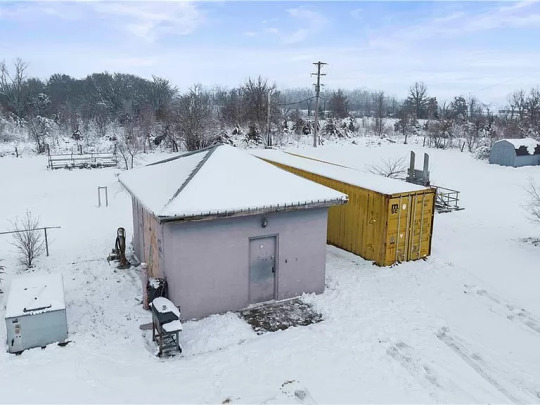
Today, we have a bunker for sale. It's not as interesting as a decommissioned missile tower. "Originally constructed in the 1960s at a cost of $4.5 million, an equivalent value today exceeding $34 million, this bunker represents the pinnacle of security and resilience." Located in Polo, Missouri, 35 min. from Kansas City, it has 4bds, 2ba, $2M.
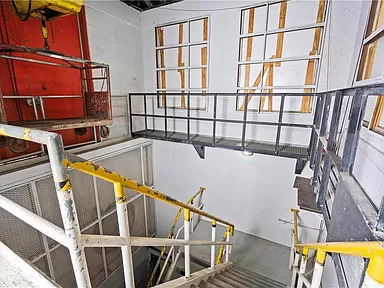
The entrance hall has an industrial look, but they tired to make the home look elegant.
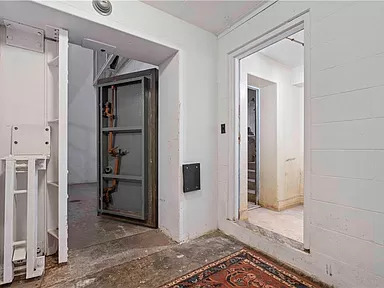
It has 2 massive 3,000 pound blast doors, 2.5-foot-thick concrete walls, additional layers of earth & EMP-resistant copper shielding, plus an emergency escape hatch and a towering 177-ft communication tower.

it's roomy- look at the size of the living room. One must wonder why people decorate these with traditional furniture. It needs colorful, modern stuff.

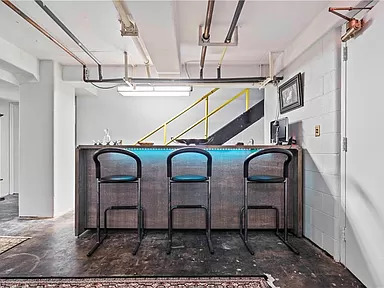
There's a bar for entertaining.

One of the bathrooms.

This is a soundproof room- it's not as if there are any neighbors around, though.
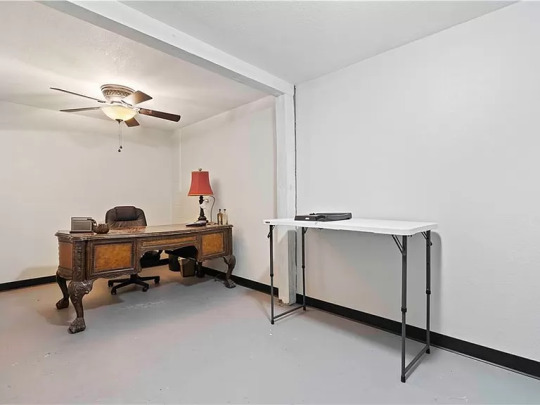
They have a home office here.

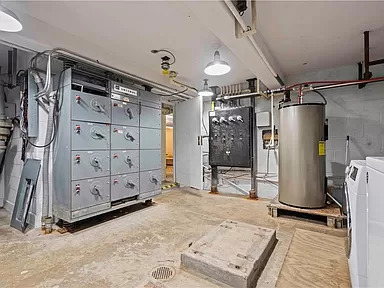
Laundry and stuff. The self-sufficient home has a private water well, a pump, and a 10,000-gallon stainless steel water storage tank, all connected to a Water Filtration System.
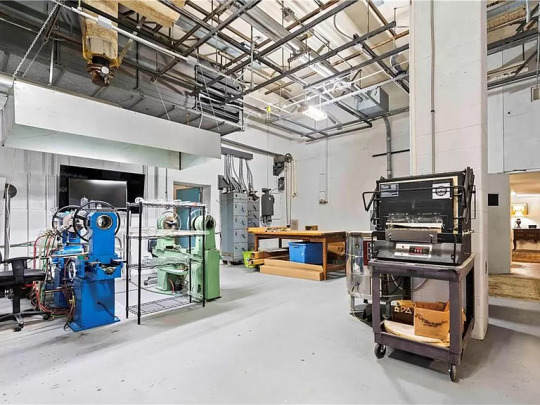
And, here's your new hobby- it's a glass blowing studio. I wonder if the owner would teach the new owner how to use it.
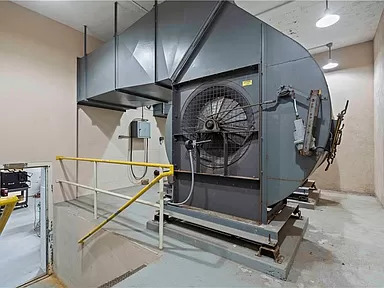
Looks like a massive air system.
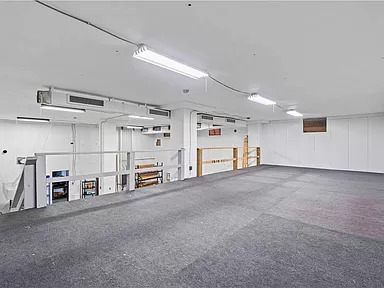
Above the workshop is a large loft area.


There's a family room- notice the windows above, they are for some of the bedrooms. There's also supposed to be a home theater room, but it's not shown.
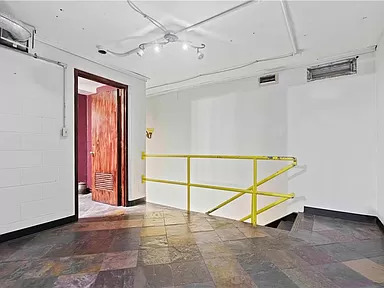

On the 2nd fl. is the 2nd bath. Not liking the hole in the wall behind the toilet.

This is the kitchen.


This is an odd place to locate the kitchen w/all this other equipment.

Through the kitchen you can see the upstairs living room.

You can see that the kitchen is on the other side.


The bedrooms are off a hall off of the living room.



The bedrooms.
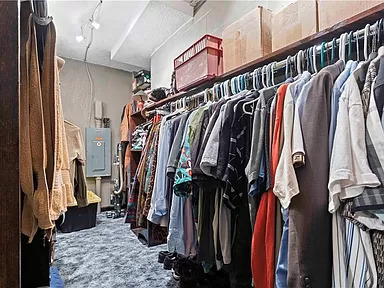
This area serves as a closet.

The plot of land is 10.5 acres and the real estate description suggests that you can built your dream home on it, over the bunker.
225 notes
·
View notes
Text

thank you to @therebelcaptainnetwork for hosting secret santa again, which is the most wonderful time of the year (and the only time i muster enough energy to write, wah)!
my gift is for the lovely @toooldforthisbutstill, who asked for fluff, snow day/rest day, green/earth tones, or hope. i'm sorry i couldn't manage historical or fantasy, but i hope this small slice of life pleases nonetheless.
you can also find this fic at ao3! without further ado, here is:
you're gonna lead me home
The thing about peacetime is this:
There is no manual. There isn’t a set of instructions to follow in order to live in it to the best of one’s ability - especially if one (or two, in this case) are far more used to (and suited for, all things considered) doing whatever it takes to survive wartime.
You are simply taken from everything you’ve ever known and thrust into an entirely new situation with no guidelines and you are told ‘hey, good luck’.
While Cassian concedes that it’s not entirely true that he and Jyn had been airdropped into the unknown since they had been offered an apartment in glittering Coruscant and declined, but it still feels overwhelming at the best of times. This small, nondescript home on a small, temperate, mid-rim world is theirs to do with as they please.
At first, what they do is take stock of their new surroundings, taking careful note of what needs repairs or upgrades, what they can realistically immediately renovate and what may need to wait. More importantly, they examine every inch of their home and the land that surrounds it and they make intricate plans for how to keep themselves and this place safe.
You can take the soldiers out of the war, after all, but the war never really seems to end.
Cassian used to like to pride himself on how quickly he’s been able to adapt to any number of situations during his years as a spymaster, but another thing he’s learning is that the skills he’s gained from years of doing the hardest work imaginable don’t always translate to his new life.
And learning on the fly isn’t always quite so easy when there’s not the threat of death hanging over his head if he fails. Still, sometimes he thinks that death might be slightly easier to bear than disappointing Jyn.
Okay, so that’s a little dramatic, but not entirely inaccurate.
They have both spent most of their lives never staying anywhere long enough to put down roots. The relationships they have built have been superficial at best, because no matter how much it’s hurt to do it, they knew that disappearing was always what they were best at and what was necessary in order to survive another day. They have kept to the shadows and engaged in distasteful things they’d rather forget because there simply wasn’t any other option at the time. They looked over their shoulders constantly, because they never knew when a blade might be plunged into their back, metaphorically and literally speaking.
And that mindset is perhaps the hardest thing to rid themselves of.
Some days are easier than others. With no strict timetable to follow, new routines must be created, otherwise they both bristle at having so much free time and nothing to fill it.
Cassian finds that he’s rather adept at some of the repairs that need doing - the leak in the water filtration system comes to mind - and what he can’t figure out on his own, the holonet helps him learn. The same with cooking, actually. As it’s turned out, for as capable and dangerous as she can be in other areas, Jyn Erso is a complete disaster behind the stove and doesn’t quite possess the patience to want to learn to be otherwise. So Cassian has shooed her out of the cramped kitchen and taken over the cooking duties. He’s surprised by the natural affinity he seems to have for it and sometimes (when he’s feeling maudlin) wonders if in another life, that’s a path he would have gone down.
Some days, life doesn’t feel quite so difficult to navigate. Some days, he’s almost convinced that they’ll manage just fine.
And then there are the bad days.
There are days when one or the other or both of them revert to a state of readiness (and paranoia) that something’s going to happen if they are not hyperaware of every single thing in their immediate vicinity, every tiny noise more than enough to ramp emotions to the point of no return. And stars help them when they cross that point, because the blowup is not pretty. Neither is the aftermath.
If they’re lucky, the result is simply snapping at each other and then pointedly avoiding the other until their tempers settle. They would never put hands on each other, but when snapping turns to worse - well, they can wound each other terribly using just their words.
Icy little shards of insults that hit their target with startling accuracy every single time.
What’s worse is that neither are accustomed to apologizing, despite knowing when they’re in the wrong or when they’ve taken one step too far.
Sometimes, Cassian chooses to focus on repairs to keep himself busy, and if he feels like a particular argument requires more of a distance between he and Jyn, leaves a message letting her know he’s heading into town for supplies. Despite any simmering bad blood between them, he’s perceptive enough to know that not leaving that note would only just make everything all the worse. The sense of abandonment still runs deep in her veins, even though he has promised over and over again that he is with her come what may.
He leaves her to get her aggression out in her garden, or chopping wood, the type of hard physical labor that results in a good, deep sleep once the day is over with.
Repairs get done quicker than anticipated when there are a spate of bad days in a row, and soon, the barebones skeleton of their new home starts to come together in earnest. He only hopes that in time, they’ll both learn how to enjoy it without the fear of everything falling apart hanging over their heads, and that they’ll be able to build the life together that neither believes they truly deserve, deep down.
Sometimes, when the blood runs hot, not bad, they find themselves taking their frustrations out on each other physically - not sparring, although that is an option, but in a much more intimate and pleasurable way. All they need is the closest room or free surface and eventually, verbal jabs turn into gasps and moans, and when all is said and done, they may be disheveled and sweaty and breathless, but any annoyance felt toward each other has disappeared, replaced by satisfaction.
Things are still awkward afterward, as they are wont to be when a real apology hasn’t come, but Cassian’s learned that he and Jyn still find ways to offer one without words.
He’s learned to read her body language like a book and knows when she’s got a headache. He doesn’t say anything, but gently sets a steaming cup of tea down in front of her that he’s sure will alleviate her symptoms enough to allow her to participate in her usual activities. Thanks, holonet.
And Jyn's observation skills are unmatched. Even if Cassian never complains out loud, he will sometimes find exactly what he needs waiting for him, and he knows there’s only one person that could have done it. He tears his favorite pair of gloves, and later finds them stuffed in the pocket of a jacket, carefully darned back together and stronger than ever.
A tool needs replacing or a knife needs sharpening? He’ll find them exactly where he’s left them last, brand new and glittering or looking sharp enough as though it’s never been used countless times before.
I’m sorry may not come very naturally to them, but by stars, they are doing their best. As far as he’s concerned, that’s got to count for something.
Sometimes, on particularly clear nights, an apology can look like curling up together on the soft grassy hillside to silently stare up at the sky together, letting the peace and stillness wash over them as they watch shooting stars overhead. Those times, nothing needs to be said. It’s enough that Jyn’s resting her head over Cassian’s heart, letting the steady beating of his heart lull her into relaxation. It’s enough to be able to press a gentle kiss to the top of her head and be assured that even if he can’t see it, she’s smiling.
Sometimes, it’s enough to know that through it all, the good days and bad days, the lessons they’re still learning about how to live, the love always remains.
The rest will come in time.
#rebelcaptain secret santa 2024#rcss 2024#stuff which lauren writes#stuff which lauren watches#rogue one: a star wars story#jyn erso#cassian andor#jyn x cassian
38 notes
·
View notes
Text
As is turning disturbingly into custom, I have a paper to write and I can't think unless I start writing to somebody first.
The topic is the Flint Water Crisis. Our focus, corrosion and why it happened. The nuance I'm adding for spice: Ancient plumbing.
So, in Flint, Michigan, the major players are the Detroit Water and Sewerage Department (DWSD) and the City of Flint (Flint). The City of Flint is in a $25 million deficit and their contract with DWSD to supply water expires in 2014. In 2011, the state has put the city under Emergency Management, which is trying to decrease spending, essentially. Additionally, since 2004, DWSD has been upping their service rates at a yearly 6.2%, or 62% total (expensive). And kind of an asshole move since Flint has been buying water from DWSD since 1967.
Flint has their own water treatment plant that's been an emergency backup to the DWSD-supplied water, but it is only operated 4 times a year just to ensure it can function.
Flint says Fuck This Actually, and in 2013, decides to pull water from Lake Huron; but this pipeline is still being developed and only due to be online in 2017. So Flint decides for the 2-3 year period, they can pull water from the Flint River and treat it in their own treatment plant. They hire an engineering firm to retrofit the plant and email Michigan Department of Environmental Quality (MDEQ) for quality guidelines to follow during plant startup.
At this point, Flint was incorrectly told by MDEQ they DID NOT have to continue adding phosphates to the water as corrosion control, which the previous plant had been doing. They could start up as normal, and check every six months for any lead issues. Additionally, to control the amount of trihalomethanes (fancy word for a gas molecule with three halogens, a hydrogen, and a carbon) already in the water, the plant added FeCl3 as a disinfectant and flocculant (purifies water via latching onto other molecules and allowing them to be filtered out) instead; FeCl3 is non-toxic, but increases the water corrosivity in an already corrosive system.
This is where the more known portion of the story begins: people immediately notice the changes in the water, including increasing discoloration and are concerned. It's policy to have a monitoring pool of homes for quality control, and Flint had that, but it's also policy to have 50% of those homes contain lead service lines and none on the Flint circuit were. They also didn't sample the homes that were on the circuit properly to pick up lead in the system, so the lead numbers that were picked up, were likely minimized.
So on one hand, you have people (and a whole lot of visual evidence) pointing to a damaged, polluted water supply, and test results that don't show anything abnormal.
Resident Zero took water samples to show to the city, and then independently sent them to Virginia Tech. The minimum concentration of lead in all the samples was 217 ug/L, 14.5 times the EPA action level of 15 ug/L. And as the sampling occurred, lead levels increased in the last five samples, so not even flushing the pipes (common precautionary treatment for any nasty buildup in pipes while water hasn't been moving) was adequate protection for any home inhabitants.
The reason this occurred was the corrosion of lead scaling that had built up on steel service lines outside homes (Fig 1). Typically, when phosphate is used as a corrosion inhibitor, soluble metals precipitate and create a scale on the pipe. Nothing goes into solution or the house, and things are fine and dandy. Without corrosion inhibitors, not only was the original corrosive contact occurring between the steel and lead pipes, but the scale was being removed and carried into the system. 99% of the contamination was due to this scale, as noted when solid filtration was used on the water samples and lead values decreased.


(Pieper, et al 2017)
+ Findings
+ Corrections/future learnings
+ Rome
29 notes
·
View notes
Text
The Benefits of a Cat Water Fountain: Keeping Your Feline Hydrated and Healthy
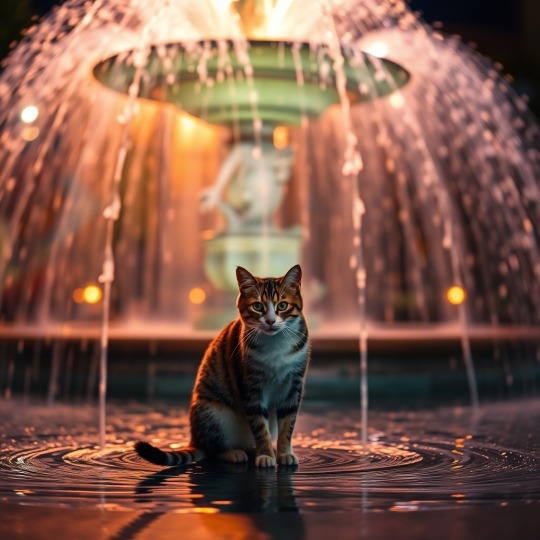
Cats are known for their independent nature, but when it comes to their hydration, they often need a little extra encouragement. Many cat owners struggle to get their pets to drink enough water, which is essential for their overall health. One of the best solutions to this issue is investing in a cat water fountain. This simple yet effective device can significantly improve your cat’s hydration habits.
Why Hydration is Important for Cats
Unlike dogs, cats have a lower natural thirst drive due to their evolutionary history as desert animals. This means they might not drink enough water from a standard bowl, leading to dehydration. Chronic dehydration can contribute to urinary tract infections, kidney disease, and other serious health problems. A cat water fountain provides a fresh, continuously flowing water source that encourages more frequent drinking.
Key Benefits of a Cat Water Fountain
1. Encourages Drinking
Cats are instinctively drawn to running water. In the wild, flowing water is usually cleaner and safer to drink than stagnant water. A water fountain mimics this natural preference, enticing cats to drink more often.
2. Filters and Purifies Water
Most cat water fountains come with built-in filtration systems that remove impurities, such as hair, dust, and bacteria. This ensures that your cat always has access to fresh and clean water, reducing the risk of illness.
3. Reduces the Risk of Urinary and Kidney Issues
Since many cats don’t drink enough water, they are at risk of developing urinary tract infections and kidney disease. By providing a continuous flow of clean water, a cat fountain encourages increased water consumption, supporting better kidney function and overall health.
4. Keeps Water Fresh and Oxygenated
Standing water in bowls can become stale and unappealing to cats. A fountain keeps water circulating, preventing stagnation and improving oxygenation, making it more enticing for your feline friend.
5. Lowers Maintenance for Owners
With a traditional water bowl, pet owners need to change and clean the water multiple times a day to keep it fresh. A cat water fountain, equipped with a filter, requires less frequent refilling and cleaning, making it a convenient option for busy pet owners.
Choosing the Right Cat Water Fountain
When selecting a water fountain for your cat, consider the following factors:
Material: Stainless steel, ceramic, or BPA-free plastic options are available. Stainless steel and ceramic are generally more hygienic and durable.
Filtration System: Look for models with replaceable carbon or charcoal filters to ensure optimal water purity.
Size and Capacity: Choose a fountain that suits your cat’s needs, especially if you have multiple pets.
Noise Level: Some fountains can be noisy, so opt for a quieter model if your cat is sensitive to sound.
Ease of Cleaning: A fountain with removable, dishwasher-safe parts makes cleaning hassle-free.
Conclusion
A cat water fountain is a worthwhile investment that can significantly improve your cat’s hydration and overall well-being. By providing fresh, clean, and appealing water, you can ensure that your feline friend stays healthy and happy. Whether you have a finicky drinker or just want to offer the best hydration solution, a cat water fountain is an excellent choice for any cat owner.
#catwaterfountain#cat lover#cats of tumblr#cute cats#cats#kitty#cute animals#kittens#mod party cat#kitties#pets#warrior cats
24 notes
·
View notes
Note
supernatural frat is INTRIGUING me,,,
XD Okay. So.
Supernatural Frat is exactly what it sounds like XD (My temporary titles are often kinda basic descriptions of what the fic is about)
So I have Grian, Scar, Impulse, Skizz, Etho, Joel, Jimmy, and Tango all living together in a fraternity, going to college/university. But all of them are some sort of supernatural creature. This is a contemporary fantasy fic where there are supernatural creatures hiding among human society, and this fic is no exception. But the humans in the area know supernatural creatures exist and know that this university is kind of a hotspot for them to go to school, but all supernatural creatures at this university tend to live in private, exclusive fraternities or sororities for the safety of the supernatural world.
I won't tell you what everyone is, but Jimmy is a merman who is largely unimpressed with life on land. Although he's very much attracted to his goofy, blond roommate
Anyway, the TIES crew are a punk band who all lived at the same frat last year, while the Bad Boys + Scar are the newcomers to this frat, and are greeted their first morning after moving in by the punk band playing music
And thus starts off a university school year to remember!
-
Here's a lil snippet!
"You know. That pond outside our windows isn't actually a pond," Tango remarked. "What?" Jimmy peered out the window. "What is it, then?" "One of the guys who lived here before I did was a... crap, what was the term again?" Tango's brows scrunched. "They have seal coats..." "A selkie?" Jimmy asked. Tango snapped his fingers. "That's the one! Yeah. One of the guys was a selkie. The frat chapter had one of those natural pools built in for him. It's technically a pool, but the filtration is all natural. Vegetation and stuff. That's probably why you and your guys were selected. Reasonable accommodations for your true nature." Jimmy stared at the pond. "Oh," he said. "The window should be wide enough for you to slip out right onto those rocks next to the house," Tango said with a wink. "You can sneak out and swim whenever you want." "And I won't get sick from stagnant water?" "Shouldn't. But what do I know? I avoid swimming if I can help it."
#answered#WIP Tag Game#Supernatural Frat#that's not gonna be the official tag whenever I do anything with this WIP#I just. Have to... finish it. Y'know
21 notes
·
View notes
Text
Zaun (AITAH Arcane AU Mood board)

The City of Iron and Glass, and revitalisation
Seventy years ago, Zaun, still going by the moniker of the Undercity, was in a constant state of desperation.
The mining colony turned city, was no stranger to hardships. From unsafe mining conditions to unsafe working conditions within the factories jammed packed within the city, to unsafe living conditions due to poor maintenance to residental structure and over pollution brought on my the factories and the toxic gases from the deep mines being compressed within the underground city.
All of this was due to the conscious negligence of Piltover. Whose one and only concern was image and wealth. To them Zaun was an eyesore but they refused to acknowledge that this was due to them.
They preferred the image of being righteous and a city of academics and kept their well-shoed foot to Zaun's throat by unleashing their Enforcers upon them who dealt their "justice" in brutal fashion.
This continuous abuse and oppression had to come to an abrupt end, however.
In 1954 Piltover and its Enforcers had stepped on Zaun and Janna's (Goddess of the Wind) final nerve.
When during an arrest of a factory worker voicing his outrage for being unfairly fired, an officer took liberation to bludgeon a 12-year-old girl who had stepped in to beg her father's release before shooting dead the distraught father.
In this moment something snapped within the people witnessing the scene and every Zaun citizen present attacked the Enforcers without conern for their own lives. This attack would go on to inspire more within the city to take up arms and riots broke out everywhere, with the intention to put as many Enforcers down.
Janna tried to protect as many innocent lives caught in the crossfire as she could, but the death toll was climbing with her people dying in droves.
When Piltover took to trying to blow the bridges and starve the residents in Zaun, Janna had reached her limit and decided something more drastic had to be done.
For a month, the Goddess of Wisdom and Harmony became an unyielding and unrelenting, furious storm.
She took the fight straight to Piltover and wrecked havoc upon the city. Gleaming, unblemished structures that reached to the sky came crumbling down as if they were sandcastles within the oceans reach.
She dispersed her followers to ransack the city of the progress of food, clean water, and medicine. And kept the Enforcers secluded to Zaun, without backup and provisions and many beaten Zaunites looking for their own pound of flesh.
After a month of nonstop terror from the Goddess and many injured and homeless within Piltover, its Council flew up a white flag and begged for an audience.
Upon the Bridge of Progress, Janna stood mighty, if not unproud of her destruction, and yet resolute in her decision. She was done watching the mindless cruelty and violence to her people and would be ruling over them from then on.
An accord was struck that day.
Zaun would be its own nation from then on, and Piltover would pay compensation to the people for their negligence, in the form of money, technology, healthcare, and education.
An accord, that Piltover had no other choice but to agree to.
And this is how we come to Zaun today, under Janna's rule.
A city crushed by oppression and poverty, now turned metropolis of renewed vigor and spirit.
Zaun has transformed within the past seventy years into a technological paradise, built of off science and magic.
Its once toxic air has been dissipated by the trees that now grow within and upon every building, sustained by the HexTech-empowered artificial sun bolted to the cavern ceiling, and scheduled rainy days using the sprinkler system stretched out throughout the city. Water filtration has drastically improved drinkable water, and botany has become an essential subject in every school.
Zaun is now the cultural hotspot in Runeterra, with many coming from all over the world to visit or call Zaun its home.
You'll now find many cultures thriving within the city, as well as old structures standing proud against the tides of time.
One such building is a bar/pub called The Last Drop.
Religions of all caliber operate in Zaun, but none hold a candle to the temples of the Wind Goddess.
Mages with elemental talent, are often in high demand as they assist in the evironmental stability of the city.
And although Enforcers do still operate within the city, their presence holds neither respect nor true authority. Many Zaunites will opt to seek the services of private security firms, such as The Eye Of Zaun or the newly formed Firelights flying through the city on their chem tech-powered hoverboards; invented by 15-year-old Ekko Bennet in 2015, making him one of Zaun's first adolescent millionaires.
However, Enforcers have been reported to tiptoe on the boundaries of the two cities accordance.
With reports of Zaun civilians being killed just on the outskirts of the city, and more than a few being assaulted and/or killed within back alleys of Zaun. It is not difficult to discern what is happening.
The Enforcers are either trying to return to their old ways, or someone is looking to profit of off a potential war.
Either way, Zaun will be ready for what comes at it.
It vows to not wait for their gentle Goddess to bloody her hands again for them, they are the warriors who built this town.
#jinx#arcane#lol#vi#silco#vander#mylo#powder#claggor#ekko#Zaun#Piltover#janna league of legends#Imagine Dragons reference#The final sentence might be a little cringy but I couldn't resist#I sourced the images from Pintrest most are AI but two are screenshots from Arcane#AITAH Arcane AU#Ekko won first place in an invention competition with his hoverboard and received an investment in its mass production#Although he couldn't access his funds until he was of age and even then he isn't a big spender.#Political situation
56 notes
·
View notes